|
November 16, 2019 - No. 27
The Coup Against the Plurinational Republic
of Bolivia
and Its President
Canada Must Stop Being a Tool for
Regime Change!
Stand with the People of Bolivia Demanding
Reinstatement of the President They Elected

Mass gathering of resistance to the coup in El
Alto, November 13, 2019.
• Bolivia
During the Government of Evo Morales
• Behind the
Racist Coup in Bolivia
- Danny Shaw, Council on
Hemispheric Affairs -
For
Your Information
• Audio
Recordings Documenting U.S. Politicians and
Bolivian Opposition Leaders Organizing the Coup
• What Happened in
Bolivia's 2019 Vote Count?
Role of the OAS Electoral Observation Mission
- Guillaume Long, David Rosnick, Cavan
Kharrazian, and Kevin Cashman, Center for
Economic and Policy Research -
Expressions of
Anti-Imperialist Solidarity
• Militant
Actions in Support of Bolivian People
• Discussion on Political
Developments in the
Americas and the Carribean
• Cuba's
28th Victory at the UN General Assembly:
Animated Exchange With the Cuban Consul in
Montreal
• Canada
Must Stop Interfering in the Internal Affairs of
Venezuela! Respect Diplomatic and International
Norms!
• Rising
with Haiti: Justice, Dignity, Reparations!
- Marie Dimanche, Frantz
Andé and Yves Engler -
Coming Events
Supplement
Significant Anniversaries
• Thirty
Years Since the Fall of the Berlin Wall
- Pauline Easton -
• 134th
Anniversary of the Hanging of Louis Riel
The Coup Against the Plurinational
Republic of Bolivia and Its President
Events of the past week in Bolivia make crystal
clear that what we have been witnessing is the
culmination of a military coup against President
Evo Morales who was re-elected in the
October 20 general election and the Movement
Toward Socialism (MAS) which he leads that won the
majority of seats in both the Senate and Chamber
of Deputies.
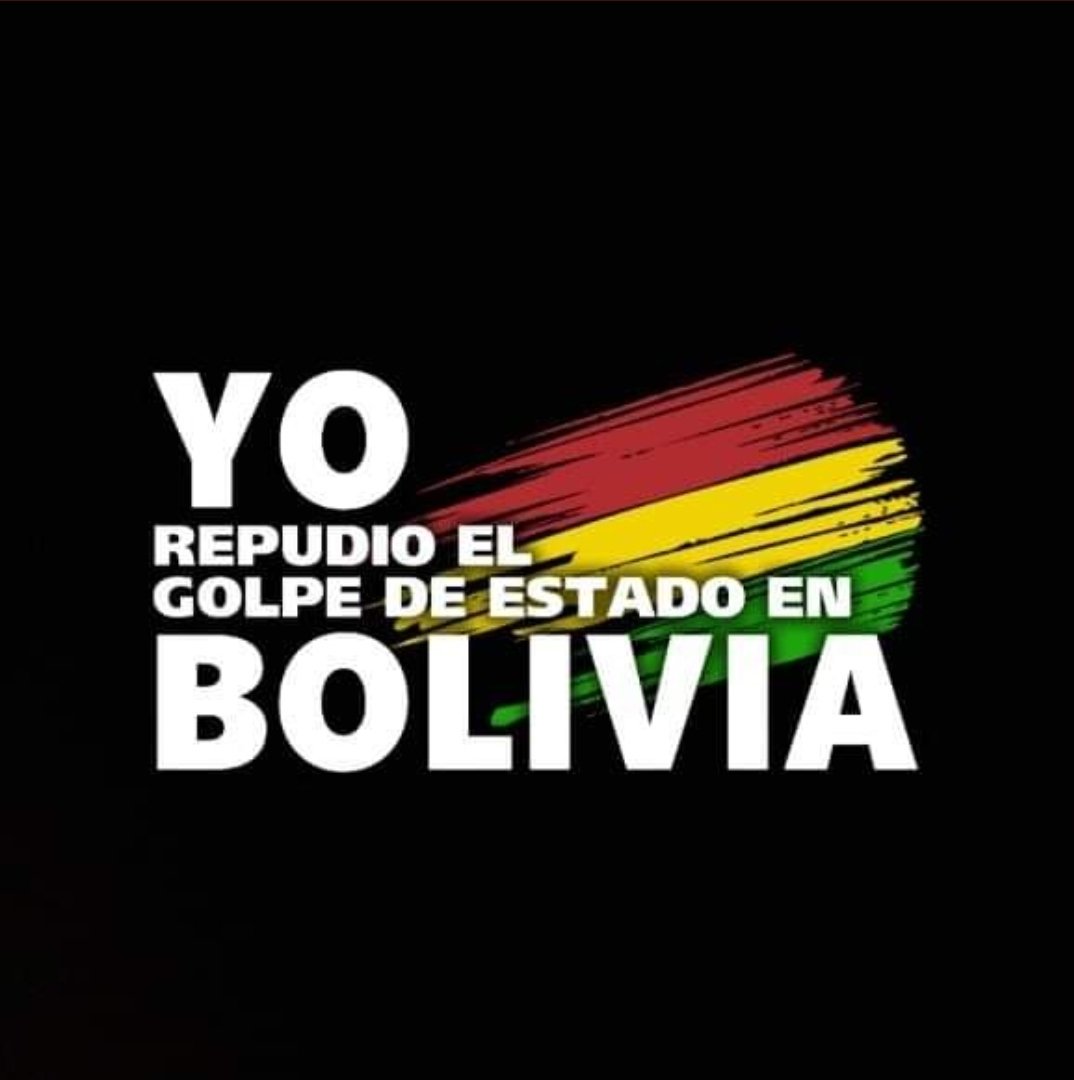 There is
irrefutable evidence that the events which
transpired over the past week are connected to
U.S. efforts to co-opt and influence military and
police forces in the region through programs it
has in place for this purpose. In addition,
leaked audio tapes have emerged which suggest
certain U.S. politicians and embassy officials
worked with retired Bolivian military officers and
opposition politicians and some others to organize
and finance the kind of violent and destabilizing
actions that have taken place as well as the
creation of a parallel government if Evo won the
election. That such a plan existed is given
credibility by the fact that according to Evo, a
member of his security team told him he had been
offered $50,000 to hand Evo over to his political
enemies. There is
irrefutable evidence that the events which
transpired over the past week are connected to
U.S. efforts to co-opt and influence military and
police forces in the region through programs it
has in place for this purpose. In addition,
leaked audio tapes have emerged which suggest
certain U.S. politicians and embassy officials
worked with retired Bolivian military officers and
opposition politicians and some others to organize
and finance the kind of violent and destabilizing
actions that have taken place as well as the
creation of a parallel government if Evo won the
election. That such a plan existed is given
credibility by the fact that according to Evo, a
member of his security team told him he had been
offered $50,000 to hand Evo over to his political
enemies.
Showing its bad conscience, the Trudeau
government refuses to acknowledge the obvious. In
its statements, Global Affairs has so far referred
only to President Morales "resigning" and its
readiness to support a "temporary caretaker
administration to prepare for new elections and
avoid a power vacuum." This means Canada is
supporting opposition Senator Jeanine Añez, a
person who, like Juan Guaidó in Venezuela,
unconstitutionally declared herself the interim
president -- in her case backed by the military,
with an army officer assisting her don the
presidential sash at her swearing-in. With the
presidency captured, opposition Añez named her own
cabinet and, belying the notion that hers is only
a caretaker administration until a new election is
held, set about dismantling programs and
arrangements of all types put in place by the
Morales government and generally unleashing a wave
of revenge-taking against its members and
supporters. If the interim "president" has her
way, not just Evo but any candidate of the MAS
will be barred from contesting the new election.
Meanwhile the police and army have been given a
green light to attack and arbitrarily arrest those
resisting the coup -- many of them members
of the country's Indigenous nations. As of
November 16, 23 deaths had been reported across
the country, many caused by bullets.
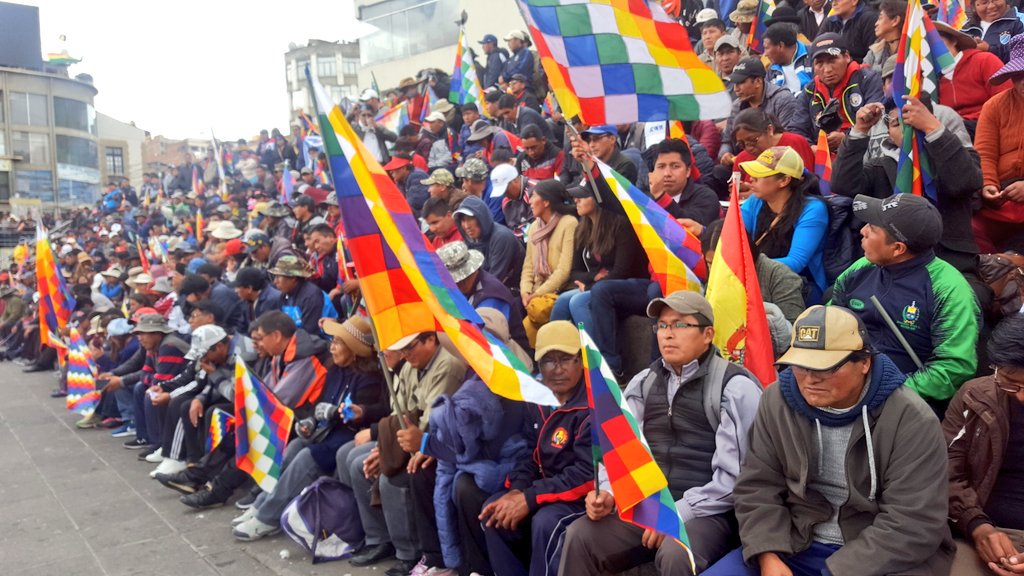
Rally of rural teachers in La Paz, November 13,
2019, demanding the self-proclaimed coup
government step down.
In the regime change operations mounted against
both Bolivia and Venezuela, Canada has been an
important player, working through the Organization
of American States (OAS) to declare elections
illegitimate or fraudulent that have not produced
the desired results. It then works with coup
forces to illegitimately remove the presidents and
governments elected by the people of those
countries.
In the case of Bolivia's recent election,
separate analyses of the results performed by
different experts do not support the conclusions
allegedly reached by the team that performed the
audit for the OAS. All the studies concluded that
the reported irregularities were not significant
and that removing the suspect number of votes cast
for Evo would not have affected his first round
victory. All of which suggests that the alleged
irregularities reported by the OAS team -- which
it provided no concrete evidence for and never
said amounted to fraud -- was the pretext needed
to call for rejecting the results altogether and
holding a new election, opening the door for the
coup forces to claim Evo was elected through
"fraud" and to make their move against him. In
whose name was Canada acting to help instigate
this?
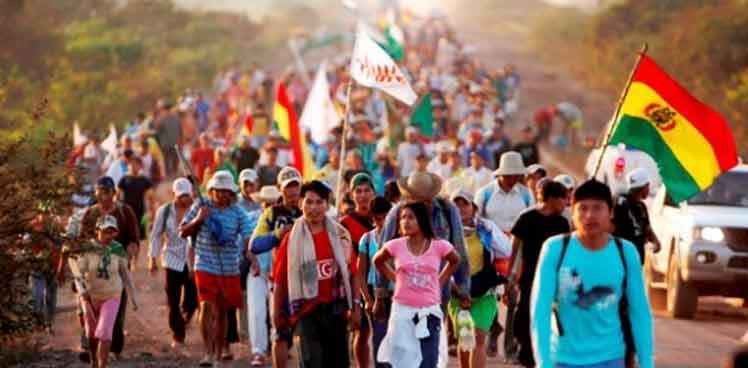
March from 20 states in Bolivia to the government
headquarters in support of Evo Morales,
November 15, 2019.
Canada has played a similar role in other
U.S.-orchestrated coups or coup attempts in the
hemisphere this century -- including the coups
against President Jean-Bertrand Aristide in Haiti
in 2004 and President Manuel Zelaya in Honduras in
2009. In both cases the leader and governments
targeted for regime change were attempting to
chart their own course for development, giving
priority to meeting the needs of the working
people and most vulnerable rather than embracing
the harsh neo-liberal remedies of the IMF that
have destroyed national economies and brought
misery to so many people around the world. In
those two cases, beyond the role it played in
supporting the coups perpetrated against those
presidents, Canada under both Conservative and
Liberal governments weighed in to prevent the
people's forces from electing their choice of
government by rushing in to support subsequent
electoral coups to ensure the continuation in
power of neo-liberal governments and the
repressive apparatus they do not hesitate to wield
against the people.
The fact that Canada was tapped by the U.S. to
lead the Lima Group, supposedly to "restore
democracy in Venezuela," shows what kind of
democracy, human rights and rule of law Canada
stands for. The Lima Group is a collection of some
of the most corrupt, repressive, undemocratic,
rights-violating governments anywhere -- among
them Brazil, Colombia, Honduras, Chile, Peru, all
of them facing crises of legitimacy and widespread
repudiation at home.
The Trudeau government's hypocrisy appears to
have no bounds. It is making endless declarations
on its own behalf and as part of the Lima Group
about the democratic and constitutional order
having been ruptured in Venezuela, warranting
punitive action by the OAS. Not only are the
people of Venezuela standing steadfast against the
attempts to bring about regime change in Venezuela
but Canada's attempts have never been realized for
lack of the required support inside the OAS
itself. Meanwhile, it is willfully blind to the
attack on the constitution and democracy -- as
well as on the lives of the people of Bolivia
demanding the return of their legitimate president
-- by the racist oligarchy now taking their
revenge on the "Indians" they so despise.
The Communist Party of Canada (Marxist-Leninist)
calls on Canadians to unreservedly support the
demand of the Bolivian people for the
reinstatement of their elected president Evo
Morales and to demand that the government of
Canada end its gross interference in the affairs
of Bolivia and Venezuela in violation of the
Charter of the United Nations, international law
and the norms of diplomacy, which no amount of
Liberal hypocrisy about working for free and fair
elections, human rights and a "rules-based order"
can hide.


Celebrations following President Evo Morales'
election to a fourth term, October 29, 2019.
1. Bolivia went from being the poorest country
in the Americas to the country with the highest
rate of economic growth in the Americas.
2. Bolivia increased its GDP by 400 per cent.
3. The eight U.S. military bases in Bolivia were
eliminated, and Evo removed the U.S. Drug
Enforcement Administration (DEA) and the CIA from
his nation.
4. Gas and water were nationalized -- these vital
services were established as a human rights,
overturning their previous privatization.
5. The recovery of the nationalization of gas to
put it at the service of the people of Bolivia
enabled the development of this great nation.
6. Twelve lithium factories, three cement
factories, two automotive factories, and 28
textile factories were built.
7. Twelve thousand six hundred and ninety-four
cooperatives were created.
8. Discrimination against the majority of the
population, that is the Indigenous population, was
eliminated and Bolivia became the Plurinational
Republic of Bolivia, thus establishing the
self-determination and culture of Indigenous
peoples constitutionally.
9. Half of public positions are held by women, of
which 68 per cent are Indigenous.
10. Minimum wage increased by 1,000 per cent.
11. Bolivia launched its first satellite, called
Tupac Katarí [named after an Indigenous Aymara
leader who led a rebellion against the Spanish
from 1781-82] .
12. The Government of Bolivia exercised power
together with the social movements, so it governed
hand in hand with the people.
13. The government became the promoter of culture
and respect for the environment, which implies
"Loving the Pachamama [Mother Earth]."
14. A pension plan for the elderly was created
for those 65 and older.
15. A financing program was established for all
students in Bolivia.
16. Illiteracy dropped from 22.7 per cent to 2.3
per cent.
17. More than 25,000 kilometres of roads were
built.
18. One hundred and thirty-four hospitals were
built.
19. Seven thousand one hundred and ninety-one
sports centres were built.
20. One thousand one hundred schools were built.
21. A new Constitution was created that
recognized the rights of workers, peasants,
students, women and the Indigenous peoples.

- Danny Shaw, Council on
Hemispheric Affairs -
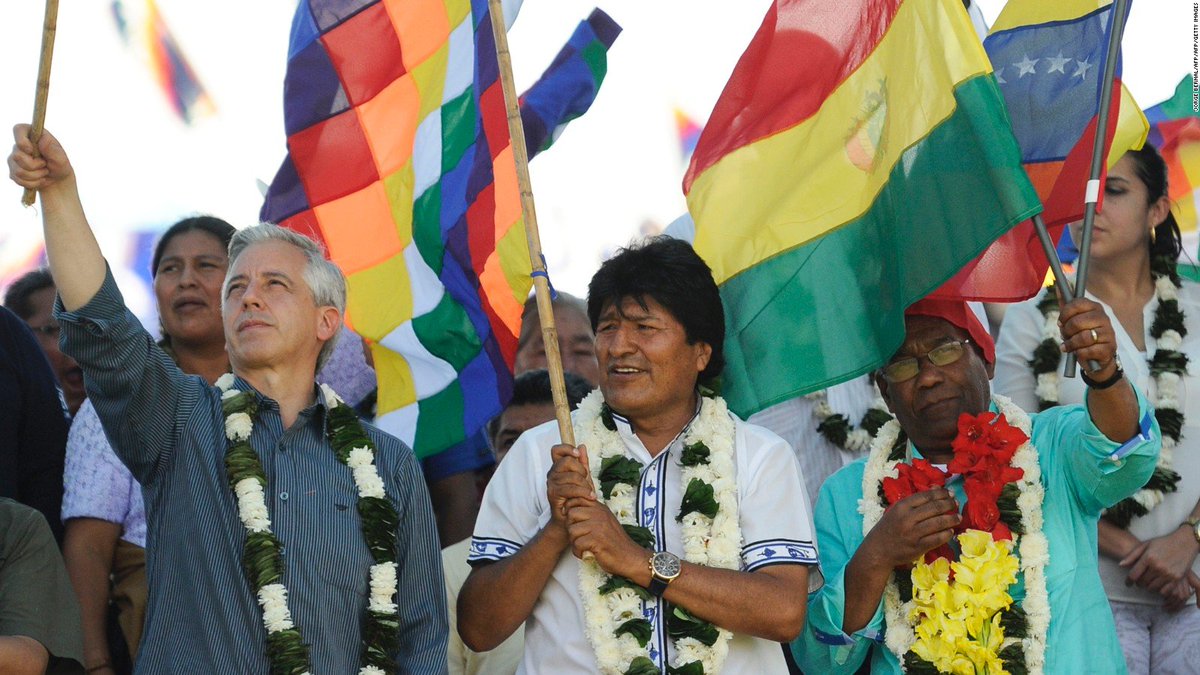
Yesterday, Sunday, November 10, at approximately
4:00 pm (eastern standard time) the democratically
elected president and vice president of Bolivia,
Evo Morales and Álvaro García respectively, were
forced to resign from power. This was no voluntary
resignation as CNN, the New York Times and the rest of
the corporate media is reporting, nor has it been
accepted by the Legislative Assembly as required
by the Constitution of Bolivia.[1] This was a coup
that employed threats and brutality against
Morales, García, members of the cabinet,
congressional representatives, and their families.
Both the commander-in-chief of the military and
head of the Bolivian Police requested, in no
uncertain terms, the resignation of Morales.[2] The coup
forces, led by Pro-Santa Cruz Committee president
Luis Fernando Camacho, continues to target
Movement for Socialism (MAS) activists,
progressive social movements, and Indigenous
peoples of Bolivia.
Behind the Misleading Headlines
The corporate press has predictably given
one-sided coverage of the unfolding situation in
the Plurinational State of Bolivia, a
resource-rich Andean nation of 11.5 million, of
which approximately 50 per cent are Indigenous[3]. While the
mainstream media act as cheerleaders for the
unrest in Hong Kong and magnify any sign of
discontent in Venezuela or any other country
perceived by the U.S. government as "enemy," it
has largely ignored the popular uprisings in
Haiti, Chile, Ecuador and beyond. Now, in the case
of Bolivia, conservative circles in the Americas
are celebrating an opportunity to take power back
from a president, administration and people who
have been a regional driving force for the
advancement of Indigenous, environmental, women's
and workers' rights. Bolivia has enjoyed one of
the most stable economic growth rates in the
Americas, between 4 per cent and 5 per cent in the
last years, and decreased poverty among millions
of Bolivians, from 59 per cent to 39 per cent,
according to official data from the World Bank.[4]
A Call for Solidarity
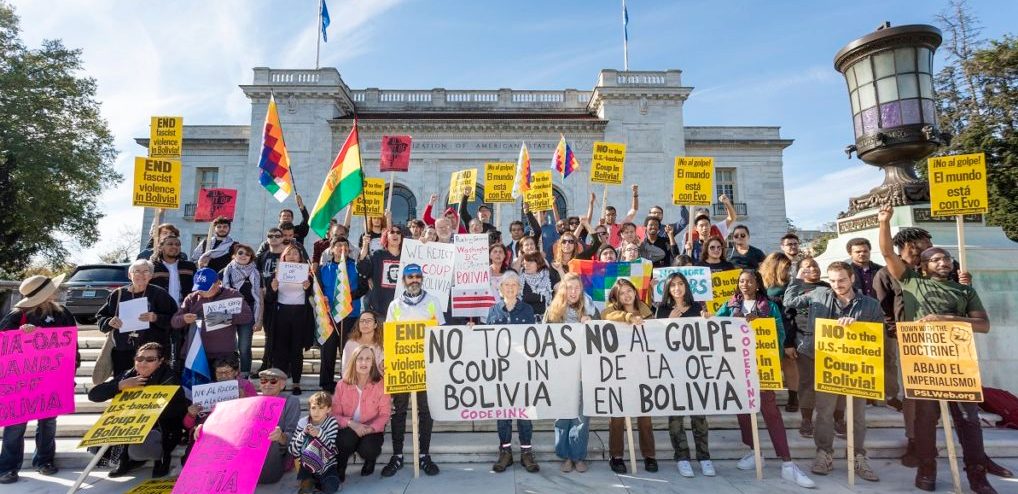
Protest outside offices of the Organization of
American States (OAS), in Washington, DC,
November 11, 2019.
On Thursday, October 24, Bolivia's election panel
declared Morales the winner with 47.07 per cent of
the votes and Carlos Mesa the runner up with 36.5
per cent of the votes.[5]
According to a Center for Economic and Policy
Research, Morales had a sufficient margin of
victory to be declared the victor in the
elections.[6]
The Organization of American States presented
findings that the election had irregularities and
that the "auditing team could not validate the
electoral results and were thus, recommending
another election."[7]
The opposition contested the election, led by
extreme right wing leader of the Santa Cruz
Committee, Luis Fernando Camacho. Camacho is
involved in the continental corruption case known
as "The Panama Papers"[8].
He also has links with terrorist and separatist
Branko Marinkovic, who enjoys safe harbour in
Brazil, which is governed by the right-wing
presidency of Jair Bolsonaro[9]. In response to
charges that the election was not valid, Morales
invited the United Nations and the Organization of
American States (OAS) to conduct an audit.[10] The
opposition rejected these calls, reiterating their
demands for Morales to step down.[11] Morales
responded to the OAS audit, which claimed there
were irregularities, by calling for new elections
and a reconstitution of the electoral commission
but the coup leaders rejected all of these
concessions.[12]
Since the anarchy began, all of president
Morales' public statements have pleaded for peace
and dialogue. However, the opposition has no
interest in the social peace the MAS built. Quite
the opposite, they want to reverse all of these
gains.
In the town of Vinto, protestors brutally
attacked, cut off [her] hair and marched MAS mayor
Patricia Arce through the streets to humiliate
her. Anti-government forces have picked up arms
and burned down the homes of MAS activists and
family members. In response, Morales said: "Burn
my house. Not those of my family. Seek vengeance
with me and Alvaro. Not with our families."[13]
The U.S. headlines do little to explain the
racial and class divide that defines Bolivia
historically and at the current moment.
Pro-democracy forces should seek to understand the
inner-dynamics at work in Bolivian society and
support the restoration of democratically elected
government and peace. Veterans of centuries of
resistance, the Bolivian people are poised to keep
resisting the coup and preserve the historic gains
of the "process of change."
Behind the Propaganda
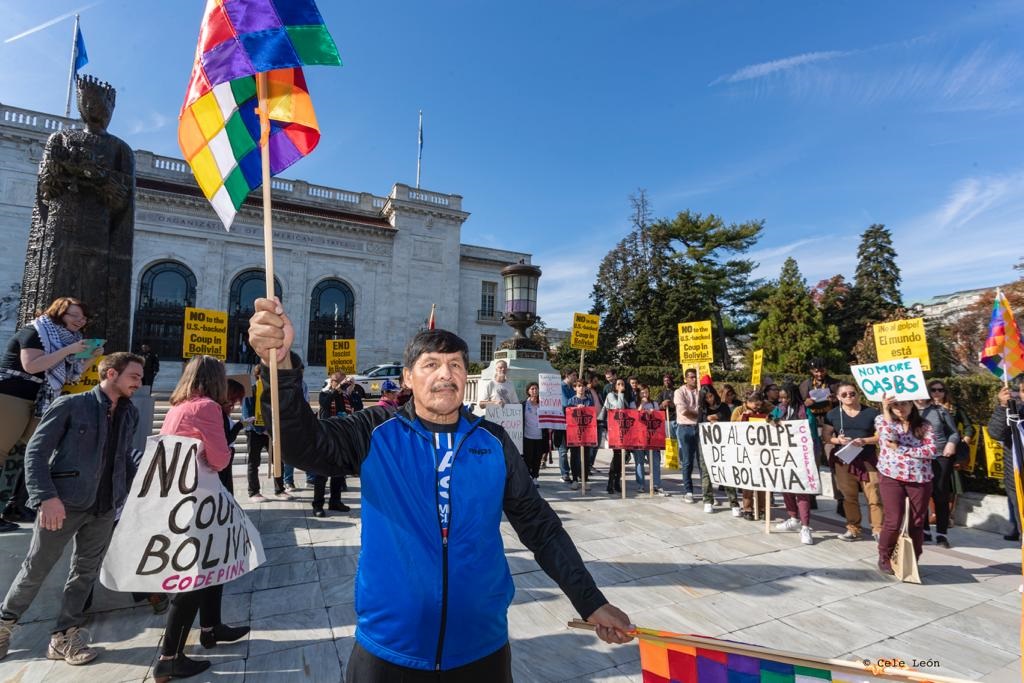 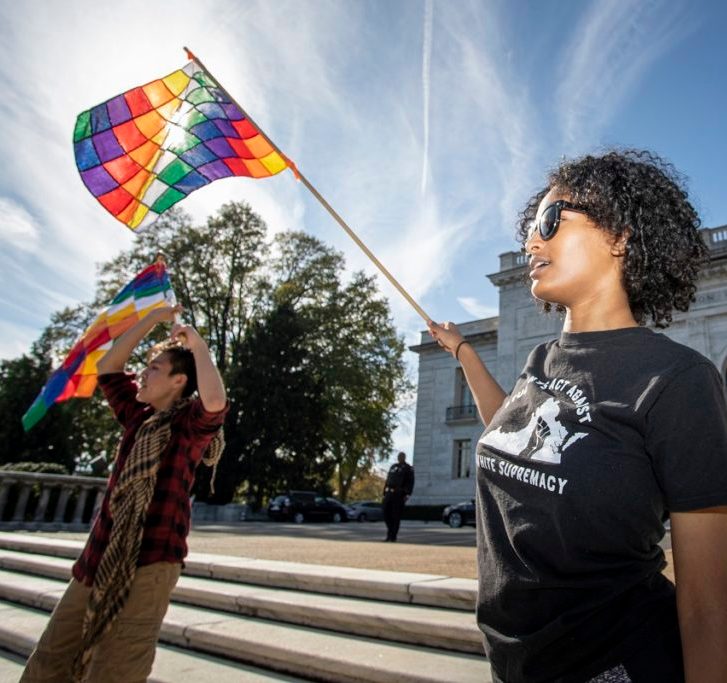
Protest, OAS headquarters, November 11, 2019.
Morales and the MAS' true crime in the eyes
of the salivating gas multinationals and their
local lackeys was the severing of Bolivia's
historically exploitative relationship with the
U.S.
In 2005, Evo Morales became the 80th president of
Bolivia and its first Indigenous. In 2006, the MAS
re-nationalized Bolivia's vast gas reserves.
Morales expelled the DEA, USAID, the Peace Corps
and the U.S. ambassador because of their agendas
of political intervention in domestic affairs,
which is illegal in any country, as it is surely
in the U.S. Aware of the 200 plus U.S. military
invasions in the continent in the 20th century,
the MAS established an anti-imperialist military
school to train their own officers and rank and
file soldiers. Cholitas, as Aymara women are
known, have made important gains since 2005.
Traditionally alienated from the formal economy
and exploited as servants in the homes of the
wealthy, Bolivia's women have carved out new
economic and cultural terrain to exercise more
self-determination over their lives.
Despite all of the social and economic gains, the
process of change was unable to completely
transform the old state apparatus over the past
thirteen years. In the decisive moment, when the
rule of law came under attack, important sectors
of the military high command and the police
supported the coup.
In Evo's own words upon resigning, in order to
prevent more attacks against innocent Bolivians,
"my sin is I'm Indigenous and I'm a leftist."
Contextualizing the Coup
Contrary to what the second-place candidate
Carlos Mesa, Luis Fernando Camacho and other
pro-coup forces would have us believe, the
violence and chaos is not just about Morales'
fourth presidential term; it is about what class
forces control the future of Bolivia.
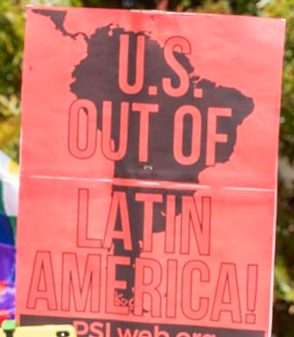 The overthrow of
the MAS government and the victory of pro-U.S.
interventionist forces, for the present moment,
represent a monumental setback for the Bolivian
people as well as for the cause of regional
independence and democracy, akin to the rise of
Pinochet in Chile in 1973. The overthrow of
the MAS government and the victory of pro-U.S.
interventionist forces, for the present moment,
represent a monumental setback for the Bolivian
people as well as for the cause of regional
independence and democracy, akin to the rise of
Pinochet in Chile in 1973.
While 66.2 per cent of Bolivians are of
Indigenous or mestizo (mixed Native and European
with the Indigenous component higher than the
European) ancestry, the violence is concentrated
in Santa Cruz and other areas where the largely
lighter-skinned, Spanish-descendent, wealthier
sectors have no interest in Bolivian unity and
democracy.[14]
The concentration of wealth in these sectors is
the result of unequal development, a direct
product of centuries of colonialism.
Santa Cruz tried to secede from Bolivia in 2008.
The secessionist forces trampled on the red,
yellow and green flag of the Plurinational State
of Bolivia, the Wiphala, electing instead to fly
the green and white regional flag. The call for
"autonomy" and the latest burning of homes and
violent attacks seek to steal back the direction
of the Bolivian state. Driven by racism and a
thirst for the unconstrained power they have been
accustomed to since the inception of Bolivia's
history, these class forces believe they have won
this round, forcing Morales and García from power.
An Insurrectionary Continent
It is important to place the temporary setback in
Bolivia in the wider context of what is unfolding
across Latin America.
Bolivia's neighbour to the south, Argentina, just
rejected the right-wing agenda of Macrismo at the
polls. To the west, Chile is in revolt against a
billionaire agenda and president, Sebastián
Piñera. Further north, Colombia rejected Uribismo
in local elections. Lula -- the most popular
politician in Brazil -- is free after 19 months as
a political prisoner. Millions of Haitians are in
the streets demanding an end to U.S.-led
exploitation and occupation. In Ecuador, there is
a popular movement against Lenín Moreno's hard
turn towards the neo-liberal economic model. And
in Mexico, President Andrés Manuel López Obrador
leads a new party which aims at building a
post-neoliberal order for the country. Venezuela
and Cuba continue to fight back against an all-out
U.S. diplomatic, military, media and economic
offensive.
The Coup Cannot Bury the Process of Change
As this article goes to press, there are numerous
official denunciations of the coup from
governments which defend the constitutional order
in Bolivia as well as expressions of solidarity
from progressive forces around the world. This is
indeed a great blow to democracy and social
justice in the Americas.
The OAS, after having failed to denounce the
violence and racist attacks perpetrated by coup
forces, has belatedly voiced support for the
preservation of the constitutional order, for a
new electoral authority, and for new elections,
all of which were sought by President Morales
himself.
The OAS statement declares:
"The General Secretariat requests an urgent
meeting of the Plurinational Legislative Assembly
of Bolivia to ensure the institutional functioning
and to name new electoral authorities to guarantee
a new electoral process. It is also important that
justice continues to investigate existing
responsibilities regarding the commission of
crimes related to the electoral process held on
October 20, until they are resolved."[15]
Now that President Morales and Vice President
Álvaro García have resigned and the coup has
polarized Bolivian society, it will be difficult
to re-establish the "institutional functioning"
undermined by the coup. Morales has been granted
asylum by Mexican authorities. Celebrants of the
anti-Indigenous victory are burning the Whiphala
in public squares. Popular mobilizations against
the coup and in support of Morales which are now
on the rise, are being met in some areas with
brutal repression by the police.[16] There are
reliable video and testimonial reports that
mutinous police, who stayed in their barracks
during the violence and destruction wrought by the
anti-government forces, are now using live
ammunition on people in El Alto.[17] Meanwhile the
MAS and other organizations that have been major
protagonists of the process of change are seeking
to protect their ranks from persecution and
regroup in order to defend the progress of the
past decade, gains which have lifted millions of
Bolivians out of poverty, revalorized Indigenous
culture, and contributed to the continent-wide
aspiration of realizing the Patria Grande.
As Evo Morales has promised, "the struggle
continues."[18]
Danny Shaw teaches
Latin American and Caribbean Studies at City
University of New York.
Notes
1. Londono,
Ernesto.
"Bolivian Leader Evo Morales Steps Down," New York Times.
November 10, 2019. See Article 161(3) of the
Constitution of Bolivia: The Chambers shall meet
in Pluri-National Legislative Assembly to exercise
the following functions, as well as those set
forth in the Constitution: 3. To accept or reject
the resignation of the President of the State and
of the Vice President of the State.
2. Statement
of Vladimir Yuri Calderón Mariscal,
Commander-in-Chief of the Bolivian Police,
who subsequently resigned his post, November 10,
2019. Also see statement
of Commander of the Armed forces of Bolivia,
Williams Kaliman, who called for Morales'
resignation on November 10, 2019.
3. International
Work Group for Indigenous Affairs (IWGIA).
According to the 2012 National Census, 41 per cent
of the Bolivian population over the age of 15 are
of Indigenous origin, although the National
Institute of Statistics' (INE) 2017 projections
indicate that this percentage is likely to have
increased to 48 per cent.
4. The
World Bank In Bolivia.
5. Krygier,
Rachel, "Bolivia's election panel declares Evo
Morales winner after contested tally; opponents
demand second round," Washington Post, October 24,
2019.
6. What
Happened in Bolivia's 2019 Vote Count? The Role
of the OAS Electoral Observation Mission, Center
for Economic and Policy Research, November 2019.
7. Preliminary
Findings of the Organization of Amercain States.
Analysis of the Electoral Integrity of the
Plurinational State of Bolivia, October 20,
2019.
8.
"Informe involucra a cívico cruceño y envían dos
casos al Ministerio Público."
9. See "Revelan
que Camacho se transporta en vehículo de
Marinkovic en La Paz," and "El
racismo de Branko Marinkovic es emulado por Luis
Fernando Camacho."
10. "Bolivia
election: U.S. withholds recognition; Morales
supporters and opposition clash as sides await
OAS audit." Washington
Post, October 29, 2019.
11. Ramos,
Daniel, "Bolivia military says won't 'confront'
the people as pressure on Morales builds,"
Reuters, November 9, 2019.
12. Bolivian
President Morales calls for new elections after
OAS audit.
13. "Statement
of the Bolivian President, Evo Morales, upon
Resigning from the Presidency," November
10, 2019.
14. http://pdba.georgetown.edu/IndigenousPeoples/demographics.html
15. Statement
on Bolivia, OAS, November 11, 2019.
16. There are reports that
the police have asked for the military to
intervene. See
here.
17. In a tweet
on November 11, Evo Morales said: "After the
first day of the civic-political-police coup, the
mutinous police repress with bullets to provoke
deaths and wounded in El Alto. My solidarity with
these innocent victims, among them a girl, and the
heroic people of El Alto, defenders of
democracy."
18. "Statement
of the Bolivian President, Evo Morales, upon
Resigning from the Presidency," November 10,
2019.

For
Your Information
The Radio Education Network of Bolivia (Erbol)
leaked 16 audio recordings involving opposition
leaders who are calling for a coup d'état against
the government of President Evo Morales, a
political action which would have been coordinated
from the U.S. embassy in the Andean country.
Among those mentioned in the recordings are the
U.S. Senators Marco Rubio, Bob Menéndez and Ted
Cruz, who would have maintained contact with the
Bolivian opposition in order to achieve regime
change in the Bolivia.
The recordings also reveal participation in the
political conspiracy of the
former prefect of Cochabamba, Manfred Reyes Villa,
who was accused of corruption in 2009 and fled
Bolivia to seek asylum in the U.S., where he is
currently living.
In their conspiracy talks, these Bolivian
politicians also mention a former Bolivian
president whose name is not given explicitly,
former New Republican Force lawmaker Mauricio
Muñoz and former Army officers Oscar Pacello
Aguirre, Remberto Siles, Julio César Maldonado
Leoni and Teobaldo Cardozo.
Click each file name to listen to the audio
(Spanish).
Audio
1: This recording illustrates the
commitment of U.S. senators Marco Rubio, Bob
Menéndez and Ted Cruz to the coup plan in Bolivia.
Audio
2: A member of the Bolivian opposition
and alleged former military man calls for an armed
uprising.
Audio
3: A member of the Bolivian opposition
(still to be identified) proposes to point out the
houses of supporters of the president's political
party, to instill fear in the population and
influence them later to support the coup.
Audio
4: A member of the Bolivian opposition
(still to be identified), raises the strategy to
be followed by the Bolivian opposition, to
establish a premise that invalidates the October
20 elections, generates a military-civil uprising
and creates a national strike. In addition, he
comments that there are active members of the
National Armed Forces and the police that would
support these actions.
Audio
5: A conversation between members of
the Bolivian opposition that shows the
participation of Manfred Reyes Villa, another
member of the U.S.-based opposition, who has plans
for a coup d'état. The support that the opposition
is obtaining from the Evangelical Church and the
Brazilian government is mentioned. The reference
to an alleged confidante of Brazilian President
Jair Bolsonaro, who also advises a Bolivian
presidential candidate who has not yet been
identified, stands out.
Audio
6: This recording shows the
participation of Manfred Reyes Villa, an
opposition member with coup plans. The voices of
Bolivian political activist Mauricio Muñoz and
Reyes can be heard on the recording.
Audio
7: A former Bolivian colonel confirms
the coup plans against President Evo Morales, and
expresses his concern about the participation of
civic committee leaders in the opposition-related
army.
Audio
8: Former Bolivian colonel Julio César
Maldonado Leoni, president of the National
Military Committee, gives orders to implement all
kinds of actions against the Cuban Embassy and its
diplomats, to instill fear and hatred towards
Cubans so that they leave the country.
Audio
9: This recording is related to a
meeting between former Bolivian military members
held in the city of Cochabamba. Former Colonel
Julio César Maldonado Leoni, president of the
National Military Committee, refers to the
creation of a political-military power.
Audio
10: Former Bolivian colonel Teobaldo
Cardoso says that everything is ready and that
they are a large group of old and active military
members ready to wage war.
Audio
11: This recording illustrates the
commitment of the politician and opposition member
Manfred Reyes Villa to plans to overthrow the
president. The voice of Reyes is heard in a
conversation with political activist and
opposition member Miriam Pereira and journalists
Carlos and Chanet Blacut.
Audio
12: On this recording is heard the
voice of former army general Remberto Siles, who
refers to the existence of a grand plan against
the Bolivian government.
Audio
13: Strategy and actions of the La Paz
Civic Committee, in the context of the National
Strike on August 21. You can hear the voice of its
president, politician Jaime Antonio Alarcón Daza.
Audio
14: This recording contains the voice
of former colonel Oscar Pacello Aguirre,
representative of the National Military
Coordinator. He mentions a secret plan against the
government of President Evo Morales and the
actions planned for October 10.
Audio
15: Private meeting between the
opposition supporters Jaime Antonio Alarcón Daza,
Iván Arias and other members of the civic
committees, in which the agreement was reached to
obtain rapid voting equipment for the next
presidential elections, to use them to manipulate
public opinion on the electoral results and
declare fraud. There is a reference from the
Jubilee Foundation, the European Union, the United
States Embassy and the Evangelical Church.
Audio
16: The political activist Miriam
Pereira links the opposition member and U.S.
resident Carlos Sánchez Berzain with the plan to
overthrow President Morales. She comments that
Sánchez wants to incite a civil war in Bolivia and
that they have a half-million dollars in
financing.

- Guillaume Long, David Rosnick,
Cavan Kharrazian, and Kevin Cashman, Center for
Economic and Policy Research (Extract) -
[...]
Introduction
On October 20, 2019, Bolivia held presidential
and parliamentary elections. Nine presidential
candidates competed in the presidential election.
However, well before the electoral campaign began,
polling indicated that the election was likely to
be a two-way race between incumbent president Evo
Morales of the Movimiento al Socialismo
(MAS-IPSP), and former president Carlos Mesa of
Comunidad Ciudadana (CC).
There are potentially two rounds in Bolivia's
presidential elections. A candidate receiving
either more than 50 percent of the vote, or at
least 40 percent with a 10 percentage point lead
over the runner-up in the first round, is declared
the winner. If no candidate meets either of these
requirements, the two candidates with the most
votes must face each other in a runoff election.
On October 25, Bolivia's electoral authority, the
Tribunal Supremo Electoral, or TSE, published the
final official election results. Morales had
obtained 2,889,359 votes, or 47.08 percent, to
Mesa's 2,240,920 votes, or 36.51 percent.
Morales's 648,439-vote lead gave him a 10.5
percentage point margin and therefore a
first-round victory without the need for a runoff.
The MAS-IPSP also won a majority in the
legislative elections. Though the MAS-IPSP lost
seats in both houses, the party held on to a
majority of 68 seats out of 130 in the lower
house, and 21 out of 36 seats in the senate.
An Electoral Observation Mission from the
Organization of American States (OAS) was sent to
observe the elections.[1] According
to the OAS, the mission was "composed of 92
observers, who [were to be] deployed in the 9
departments of the country to observe the process
in all of its stages and throughout the country."[2]
Bolivia Has Two Vote-Counting Systems, but Only
One Is Legally Binding
The TSE has two vote-counting systems.[3]
The first is a quick count known as the
Transmisión de Resultados Electorales Preliminares
(TREP, hereafter referred to as the quick count).
This is a system that Bolivia and several other
Latin American countries have implemented
following OAS recommendations.[4]
It was implemented for the 2019 election by a
private company in conjunction with the Servicio
de Registro Cívico (SERECÍ), the civil registry
service, and is designed to deliver a swift -- but
incomplete and not definitive -- result on the
night of the elections to give the media an
indication of the voting tendency and to inform
the public. The TSE is unlikely to process 100
percent of the results in the quick count in
nationwide votes due to logistical limitations and
the amount processed can vary widely by geography
and the type of ballot.[5] For
example, in the 2016 nationwide constitutional
referendum, it processed 81.2 percent of the
results before it held a press conference at about
6:15 p.m. on election night.[6] The
2016 autonomous referendum results were released
for each jurisdiction with between 66.7 and 100
percent of the results processed at 7:30 p.m. on
election night.[7] In the 2017
judicial elections, an Electoral Experts Mission
of the OAS praised the performance of the quick
count system for releasing the results at 80
percent at around 9:30 PM.[8]
The second vote-counting system is the official
count (or cómputo), which is legally binding under
Bolivian law. The official count is more thorough
and precise and takes longer. It is the only valid
vote tallying system, and the TSE uses it to
determine and announce the final election results.
Once voting has concluded, individual ballots are
counted in voting stations and aggregated into
actas, or tally sheets. For the nonbinding quick
count, the results from the tally sheets are sent
to SERECÍ verification operators via a mobile app,
along with photos of the sheets themselves. The
tally sheets are then physically sent to a
Departmental Electoral Tribunal (TED), where the
information is verified and entered into the
official count.
Each polling station has six electoral jurors.
They perform a mandatory citizens' role akin to
jury duty in the US judicial system. In Bolivia,
207,322 citizens were randomly selected to be
jurors and trained a month before the elections.[9]
All six jurors in each polling station must sign
off on the tally sheet. Representatives of
political parties may also be present at the
polling stations and request to approve the tally
sheets. Any person or political organization is
able to monitor the vote-counting process as an
observer, which is encouraged by the TSE.[10]
Images of the tally sheets are available online to
anyone who wishes to confirm that the information
on the physical tally sheets matches the
information entered into the system. This makes it
easy to check for inconsistencies, and for any
errors to be quickly corrected.
In these elections, the results of the official
count generally coincided with those of the quick
count, which ended once 95.63 percent of tally
sheets were counted, with Morales having a lead of
46.86 percent to Mesa's 36.72. The final official
count, with 100 percent of votes counted, resulted
in Morales winning the election in the first round
with 47.08 percent, to Mesa's 36.51 percent.
Criticism of Bolivia's Electoral Process by the
OAS Mission
On October 21, the OAS Electoral Observation
Mission in Bolivia (hereafter referred to as the
OAS mission, or the mission) issued an initial
postelection press release, which expressed "its
deep concern and surprise at the drastic and
hard-to-explain change in the trend of the
preliminary results [from the quick count]
revealed after the closing of the polls."[11]
In line with the quick count process in previous
elections, the TSE had ended the quick count at
83.85 percent of tally sheets verified. This tally
showed MAS-IPSP receiving 45.71 percent of the
presidential votes, and CC receiving 37.84
percent, a difference of 7.87 percentage points.
Two days later, the OAS mission issued its
preliminary report on the elections, which briefly
repeated the criticism that "the changes in the
TREP [quick count] trend were hard to explain and
did not match the other measurements available."[12]
However, the mission provided no evidence to
support these statements suggesting that the quick
count could be wrong or "hard to explain." The
following paper analyzes the election results and
finds that:
- The results from the quick count for the first
83.85 percent of the vote count are consistent
with a final projected result of Morales winning
the election outright with a more than 10
percentage point victory;
- Neither the OAS mission nor any other party has
demonstrated that there were widespread or
systematic irregularities in the elections of
October 20, 2019;
- Neither the quick count nor the official count
exhibit significant changes in voting trends in
the final results; rather, the same well-known
trend, explainable by differences in voter
preferences in different geographical areas, is
evident in both counts;
- The legally binding vote count -- the official
count -- did not stop for any significant period
of time;
- It is unclear how the OAS mission's objections
regarding the quick count would affect the
official count.
The Quick Count Process and the Official Count
There were other statements from the OAS, also
without evidence, that appeared to cast doubt upon
the result in addition to those from the mission's
first press release and preliminary report.[13]
While the TSE did suspend the verification of
tally sheets in the quick count process on
election night at 83.85 percent of tally sheets
verified, this is consistent with what the TSE had
pledged to do more than a week before the
election: to publicize the result of a quick count
that verified at least 80 percent of the
preliminary results.[14] The TSE
thus followed through with this commitment, and
its decision to stop the quick count was not in
itself irregular or in violation of any prior
commitment.[15]
Furthermore, it is important to emphasize that it
is the official count that is legally binding, not
the quick count that the OAS mission took issue
with. The official count was never interrupted and
was regularly updated online without any
significant interruption. Any potential
irregularity would have had to affect the official
count and not only the quick count in order to
affect the final result. It is unclear by what
mechanism any widespread or systematic
irregularities could occur without being quickly
apparent, given the existing safeguards in the
Bolivian electoral process.[16] In
addition to not presenting any evidence that
irregularities that could have altered the vote
count actually occurred, the OAS mission does not
even provide a possible means by which they could
have occurred.
The OAS Mission claims that after the interruption
of the quick count, it urged the TSE to restart it
and that on October 21, 23 hours after the
interruption, the TSE agreed to resume that count.[17]
At this point, the results showed Morales
approaching the 10 percentage point margin of
victory that would give him an outright win. The
Mission then issued its first press release in
which it expressed its "deep concern and surprise
at the drastic and hard-to-explain change in the
trend of the preliminary results revealed after
the closing of the polls."[18]
But was this "change in the trend" in fact "hard
to explain"?
Results: Consistent with Geographic Patterns in
Voting
It is a general phenomenon that later-reporting
areas are often politically and demographically
different from earlier ones,[19] and it has
been noted that this is relevant to interpreting
the results from a parallel vote tabulation such
as a quick count.[20] In Bolivia's
elections over the last decade and a half, votes
from rural and peripheral areas of the country
have tended to disproportionately favor Morales
and the MAS-IPSP.[21] Because of
logistical, technological, and possibly other
limitations, these votes end up being computed
later in the counting process.[22]
This is true of both the quick and the official
counts, which are both affected by the same
geography and infrastructure. Rural and poorer
places, which have tended to heavily favor
Morales, are slower to transmit data or send tally
sheets to the electoral tribunals.
The Final Quick Count Results Were Not Hard to
Explain
The quick count, in this case, was no exception.
The gap between Morales and Mesa widened steadily
as the counting process advanced. It was a
predictable and unsurprising phenomenon that need
not have surprised the OAS mission.
Figure 1 shows that the MAS-IPSP margin of
victory increased steadily as more votes were
counted, consistent with the idea that differences
in geography and infrastructure resulted in later
counting of areas that favored MAS-IPSP. This
trend also holds for seats in the legislative
assembly.[23]
Figure 1
The MAS-IPSP
margin increased steadily through most of the
quick count (TREP) as more tally sheets (actas)
were verified
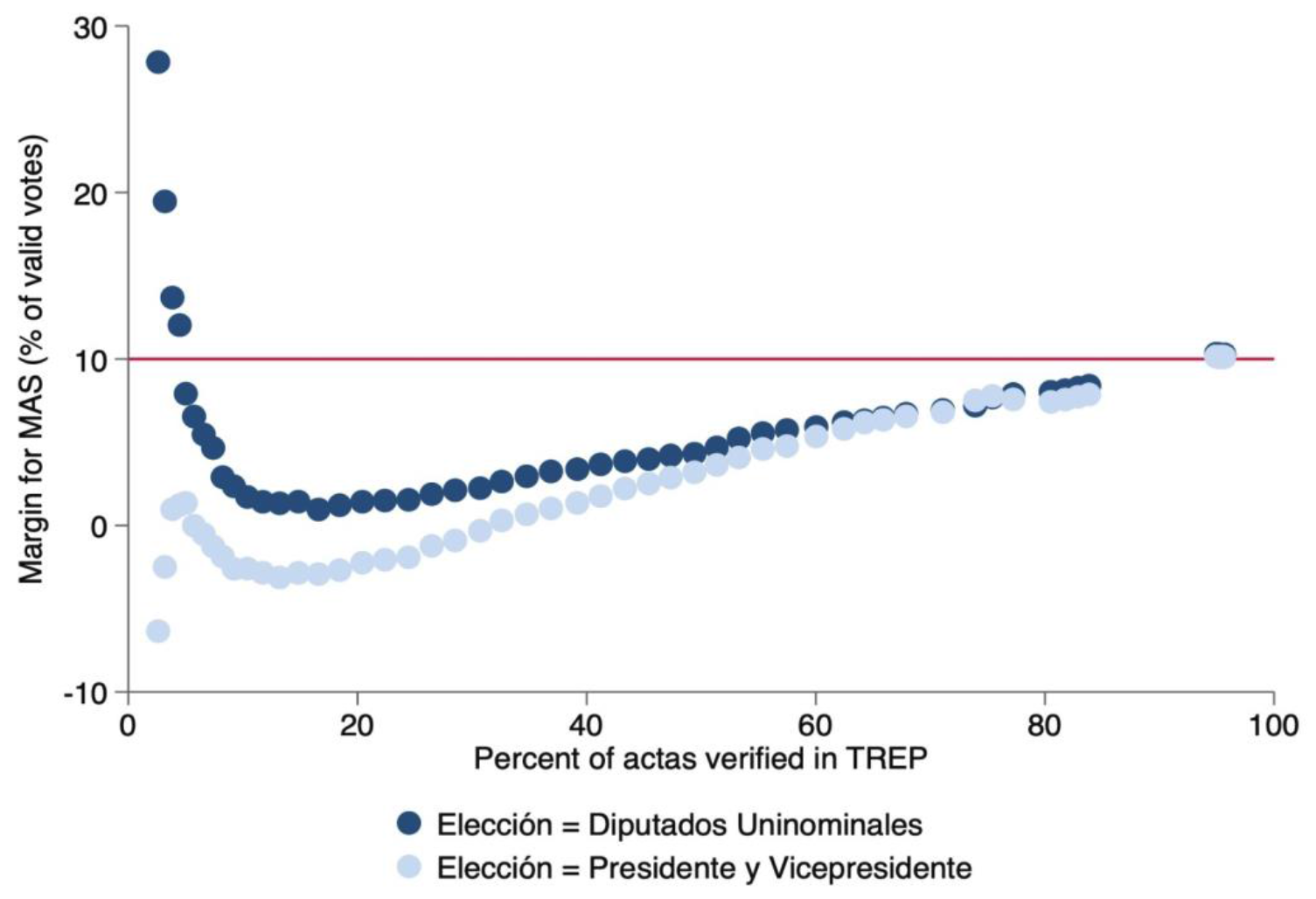
Source: Órgano Electoral Plurinacional (2019b)
and authors' calculations.
The Partial Results from the Quick Count Before
Suspension Predict a Result that Is Extremely
Close to the Final Results
The election winner's margin of victory can be
projected based on the quick count at the time of
interruption at 83.85 percent. If a tally sheet is
uncounted at that time, votes can be imputed for
each candidate based on the number of voters
eligible for that tally sheet and the votes for
each candidate per eligible voter counted in the
quick count at that time for the corresponding
precinct. If the precinct is uncounted,
corresponding votes per eligible voter for the
location, the municipality, and so on to broader
geographies as needed can be used.[24]
This exercise suggests that Morales's margin of
victory with complete results - based entirely on
the interrupted quick count - would be 10.09
percentage points, although there is reason to
believe this underestimates Morales' margin.[25] It also suggests that
Morales's margin was unusually large in the yet-
uncounted areas; sufficient even to increase his
margin past the 10 percentage point threshold as
those last votes were counted. These results are
consistent with the official count results
(showing Morales winning with a 10.5 percentage
point margin).[26]
The Results from the Official Count Follow a
Trend Very Similar to that of the Quick Count, and
Both Are Explained by Geography
Figure 2 analyzes the results from the
official count. As with the quick count, the
MAS-IPSP margin of victory steadily increased as
more tally sheets were counted. This shows a
similar dynamic, mainly that later-reporting areas
disproportionately favored MAS-IPSP.
In both the official count and the quick count,
results for MAS-IPSP legislative seats outperform
the results for the presidential ticket early in
the counting process. But as the MAS-IPSP margin
increases, the gap between the results shrinks:
for every 10 percentage point increase in the
MAS-IPSP presidential ticket share, there is a 9.6
percentage point increase in the share for
legislative seats. When CC-heavy areas are
counted, the MAS-IPSP does slightly better in
legislative races than in the presidential race,
and likewise when areas more heavily favoring
MAS-IPSP are counted, the CC does somewhat better
in the legislative races than the presidential.
This explains the "wedge" between legislative and
presidential results seen in both counts. It is
also consistent with the observation that
later-reporting areas, when the "wedge"
disappears, more heavily favor the MAS-IPSP.
Figure 2
The MAS-IPSP
margin increased steadily through most of the
official count (cómputo) as more tally sheets
(actas) were verified

Source: Órgano Electoral Plurinacional (2019b)
and authors' calculations.
In all, these analyses confirm that the overall
trends in the results from both the quick count
and the official count are easily explainable and
consistent with the fact that later-reporting
rural areas heavily favor MAS-IPSP, especially for
the presidential ticket.[27]
In addition, and contrary to public statements
from the OAS mission, an analysis of the results
of the quick count up until it was suspended on
election day predict an outcome that is extremely
similar to the actual final results.
Conclusion: The Politicization of the Electoral
Observation Process
As shown in this paper, at the time that the
reporting of the quick count results was
suspended, the existing trend supported Morales
winning the election outright with a more than 10
percentage point margin.
Crucially, the legally binding official vote count
did not stop for any significant period of time,
and the trend in results in the official count is
very similar to the trend in the results of the
quick count. The trends in both counts reflect
well-known voting patterns that occur based on
geography, and unlike claims from the OAS mission,
did not change substantially over time.
The unsubstantiated doubts cast upon the vote
count by the OAS mission in its first press
statement and its preliminary report have been
widely cited in the international and Bolivian
media, repeatedly since the October 20 election.[28] It is clear that these
unusual statements -- despite the OAS to this day
not having presented any evidence whatsoever to
support them -- have had a significant influence
on media coverage and therefore on public opinion.
The Trump administration and its allies such as
Senator Marco Rubio, who appears to have a strong
influence on its Latin America policy agenda, have
also made public statements -- both before and
after the allegations contained in the OAS
mission's first press release -- implying that the
election was stolen.[29]
The United States supplies about 60 percent of the
OAS budget.[30]
On October 25, the Bolivian government proposed an
international audit of the vote count. While
initially stating that the only institution
recognized by the Bolivian constitution to
validate electoral results is the TSE, Morales
nevertheless made it clear that he would abide by
the findings of the international audit. He
invited the OAS and a number of foreign
governments to participate in the audit. The
Bolivian government later went further and
accepted the "binding" nature of the audit, on
which the OAS had made its participation
conditional.[31] Carlos
Mesa has rejected the audit, stating that "[w]e
don't accept the audit with these unilaterally
agreed terms," demanding instead the annulment of
the official results before any audit is carried
out.[32]
The politicization of what is normally an
independent process of electoral monitoring seems
inevitable when an organization that is entrusted
with this monitoring -- in this case the OAS --
makes unsubstantiated claims that call into
question the validity of an election count. This
is a serious breach of the public trust, and even
more dangerous in the context of the sharp
political polarization and postelection political
violence that has taken place in Bolivia. These
unsubstantiated allegations should be retracted,
and measures should be taken to insure the
neutrality of electoral observation by the OAS in
the future.
The OAS, in continuing its technical assistance in
implementing a quick count system in Bolivia,
should provide guidance to the TSE on an
appropriate procedure to release and disseminate
preliminary results on election night. The OAS
also should arrange for an independent
investigation of its Department of Electoral
Cooperation and Observation; the Electoral
Observation Mission that participated in this
election; and any other part of the OAS that is
found to have responsibility for this failure of
the Electoral Observation Mission in Bolivia.
[...]
For footnotes and the Data Appendix, see the full
report.
Guillaume Long is a Senior Policy Analyst at
the Center for Economic and Policy Research
(CEPR). David Rosnick is an Economist at CEPR,
Cavan Kharrazian is a Researcher at CEPR, and
Kevin Cashman is a Senior Associate at CEPR..

Expressions of Anti-Imperialist
Solidarity
Toronto Rally Stands with Evo Morales and the
Bolivian People
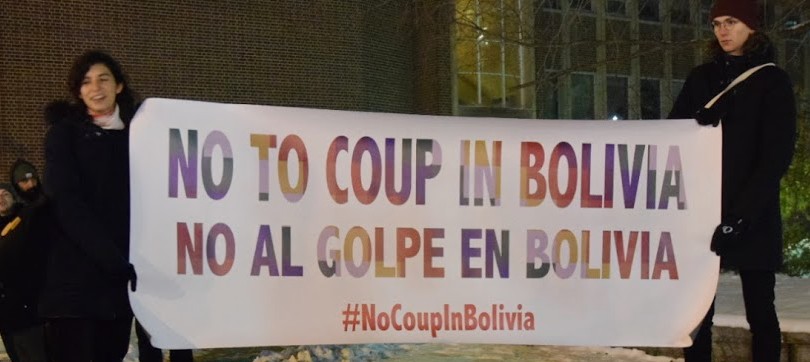
More than 80 people participated in an emergency
rally on November 12 at Matt Cohen Park in Toronto
to express support for President Evo Morales of
Bolivia and the Bolivian people, and to condemn
the coup, and its instigators including Canada,
the U.S, and the Organization of American States
(OAS), which ousted him from power two days
earlier. The action was organized by the Latin
American and Caribbean Support Network with the
participation of many organizations and activists.
Speaker after speaker denounced the coup and
condemned the violence and terror organized by the
army and police forces against the members of
President Morales' family, and members and
supporters of the Movement Towards Socialism
(MAS). Speakers demanded that the Canadian
government and the political parties in the
parliament express the will of the Canadian people
and condemn the coup and end Canada's interference
in the affairs of sovereign nations.
What was also brought out by the speakers is the
counterrevolutionary interference in Latin America
by the U.S., Canada and others with the aim of
bringing in anti-social governments, such as the
one in Brazil, that enable the plunder of the
resources and impoverishment of the peoples of the
continent by the biggest mining and other
multinationals in the world. It was noted that
President Morales, Bolivia's first Indigenous
leader, introduced many reforms that lifted the
people, particularly the Indigenous peoples, out
of poverty and built new housing, schools,
hospitals and infrastructure raising the standard
of living. At the same time, President Morales
spoke out for peace and justice internationally.
A statement issued by the MAS on November 10 was
read, condemning the coup and stating in part that
"[today] we begin a long road of resistance to
defend the historical achievements of the
country's first Indigenous government which ended
today with the forced resignation of our President
Evo Morales at the hands of a civic-police coup.
Let history bear witness to our commitment to
defend our nationalization and industrialization
program, our public companies, our social
policies, and national symbols."
The rally ended with a short march to the Toronto
office of Foreign Minister Chrystia Freeland to
demand that Canada stop its criminal interference
in Bolivia, Venezuela and other countries in Latin
American and around the world.
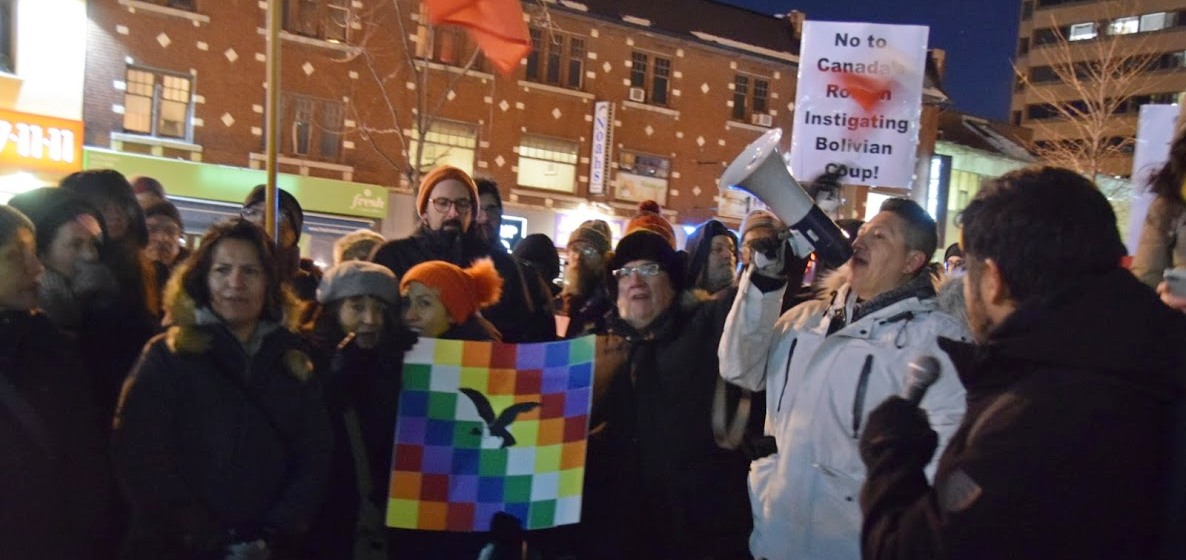
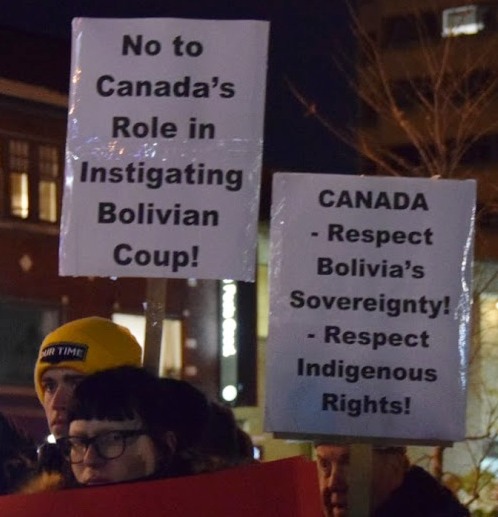 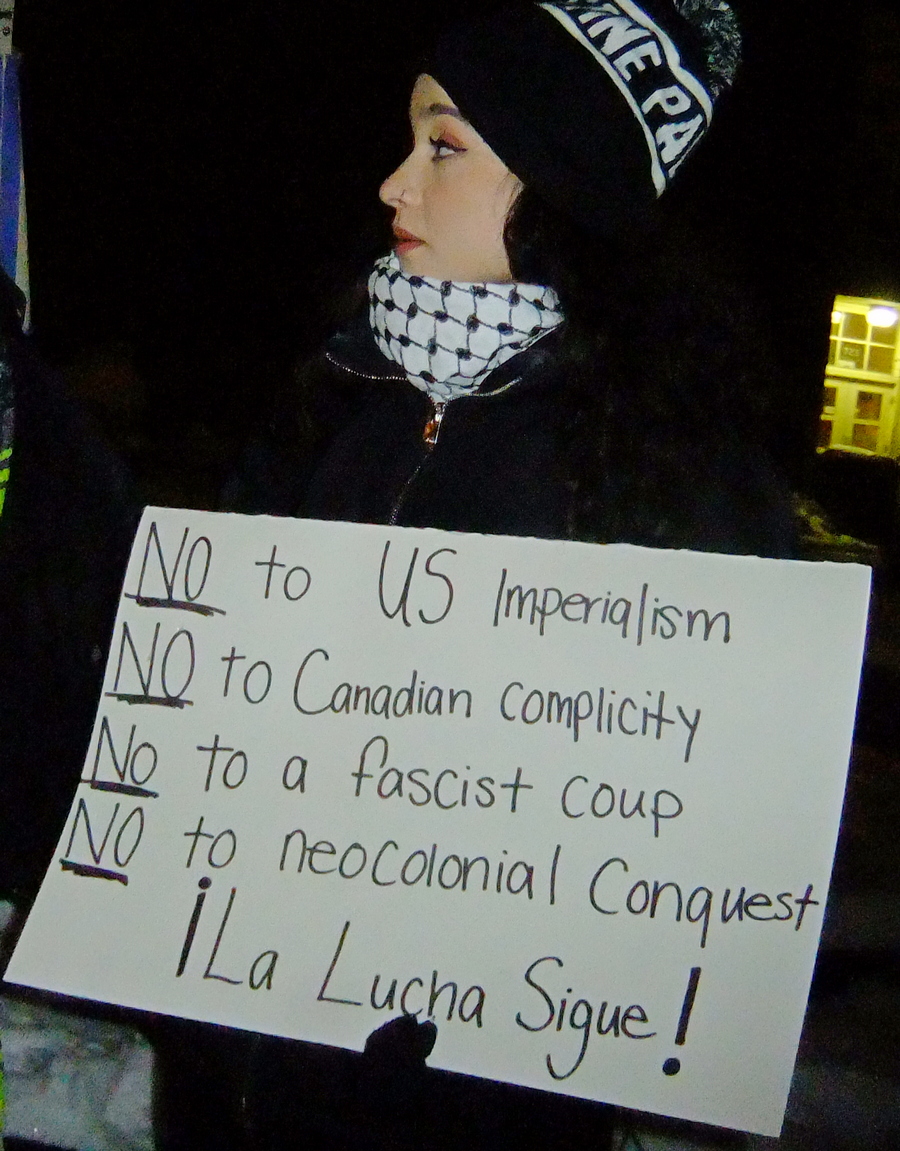
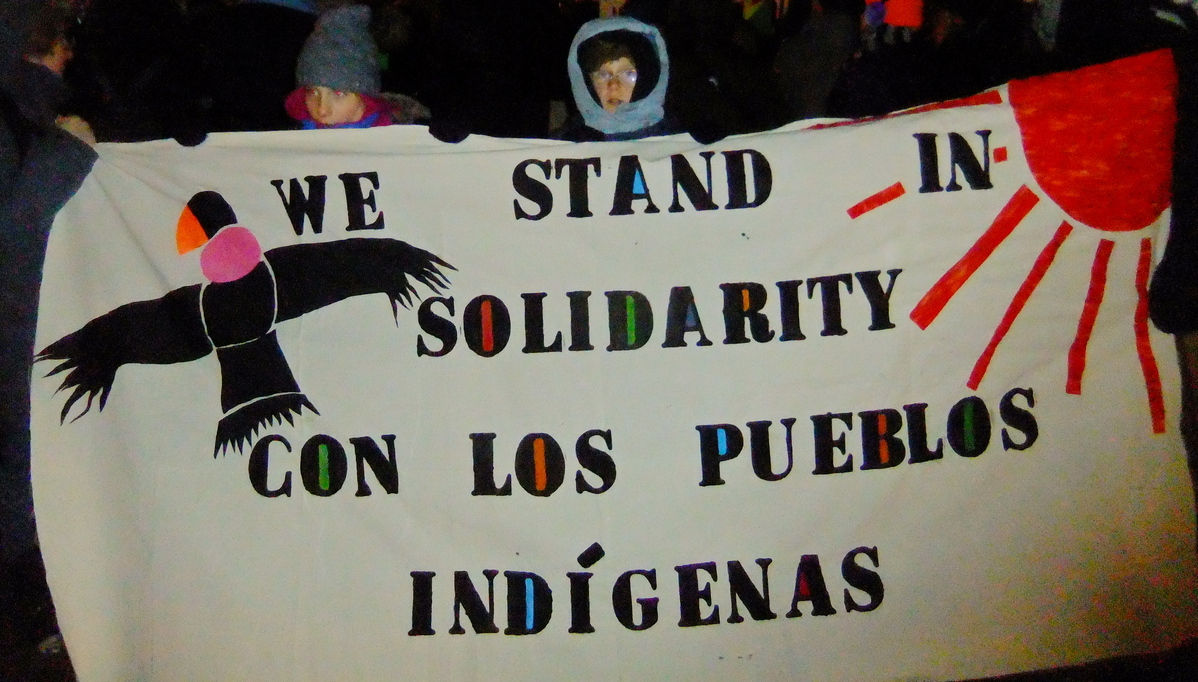

Militant Ottawa Demonstration in
Support of Bolivian People
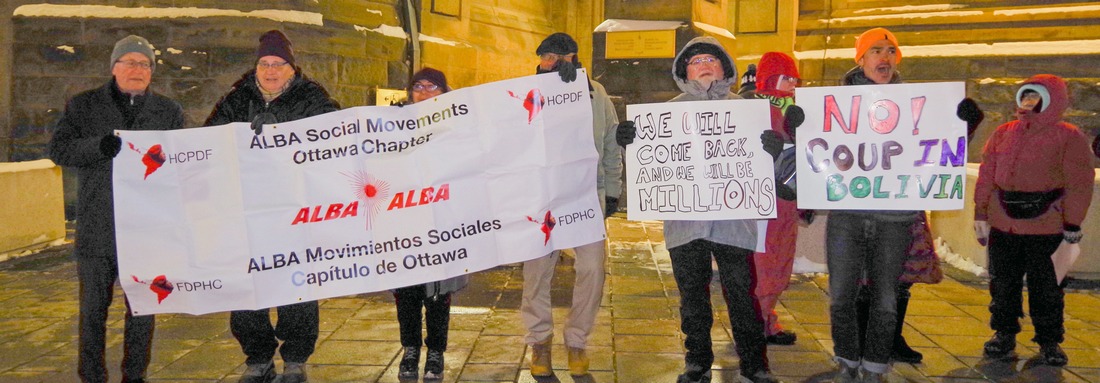
On November 12, people from Ottawa and
Gatineau mobilized on short notice for an
emergency demonstration at the office of the
Prime Minister, in support of the people of
Bolivia and their president Evo Morales. Despite
being democratically re-elected on October 20,
President Morales was forced from office by a
violent foreign-instigated coup on November 10.
Canada under the Trudeau government has been
among those pushing for regime change, including
dictating to Bolivia that the October 20 results
are illegitimate and that it must hold a second
round of voting.
Montreal Picket Calls for
Justice for Chilean and Bolivian Peoples
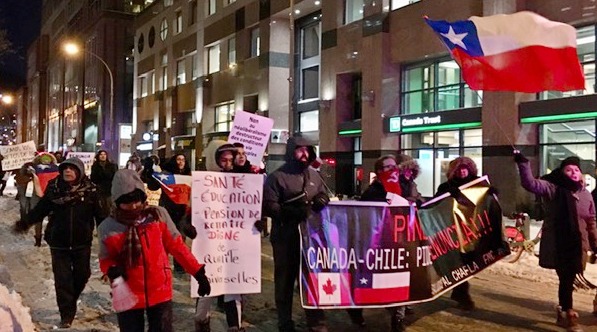 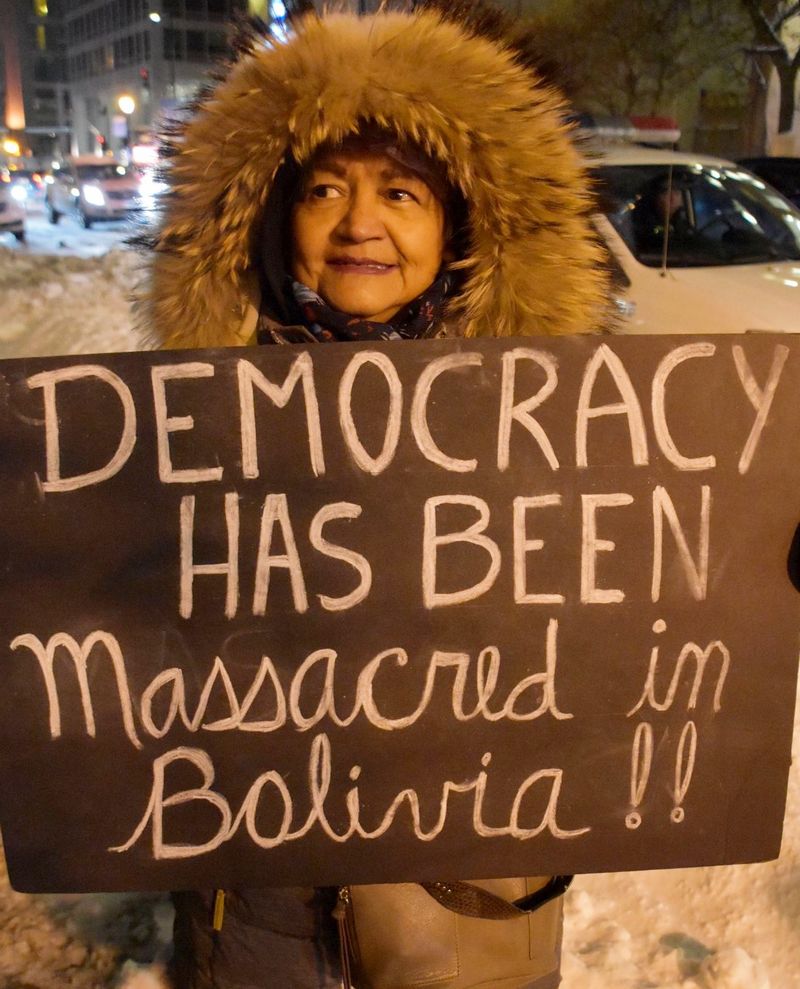
On November 12, people in
Montreal rallied in support of the Chilean
people, who are opposing the violent
repression of the Piñera government, and to
oppose the coup in Bolivia and the violence
and division being brought by the reactionary
forces there. They also called on the Canadian
government to take a stand against the
violation of rights in Chile and against the
coup in Bolivia.
 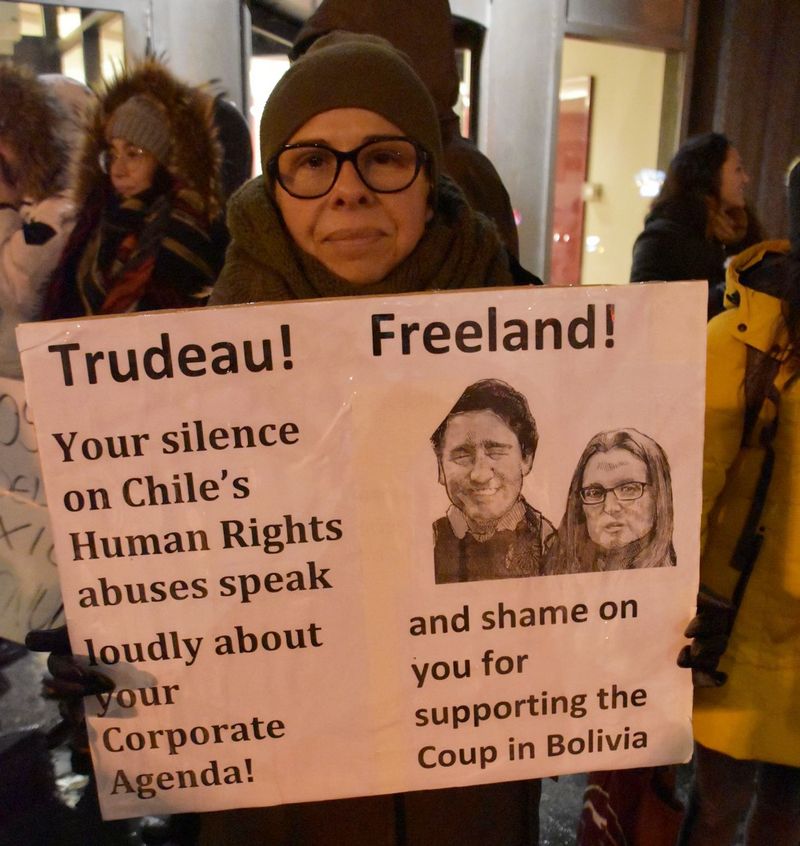 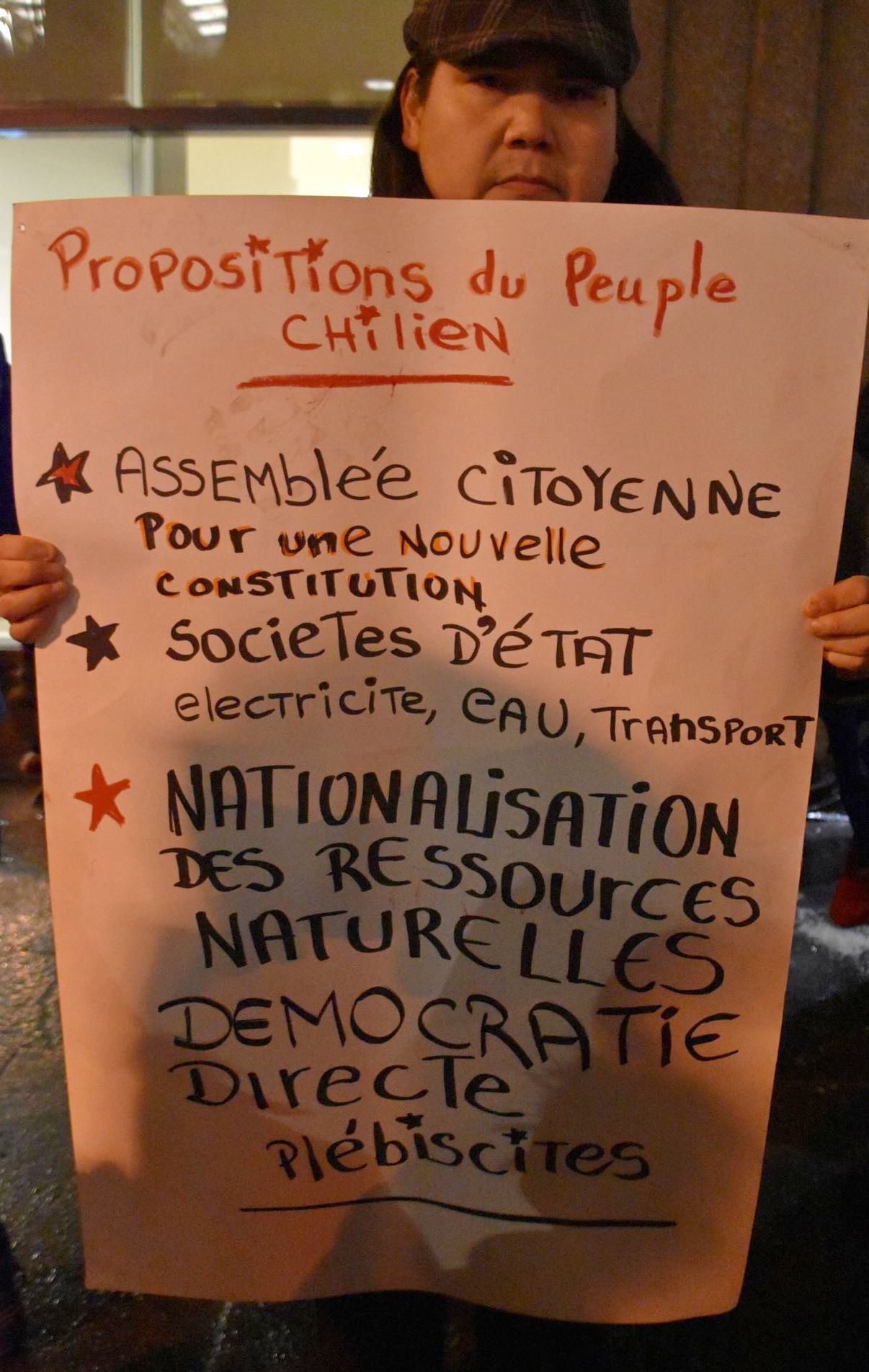
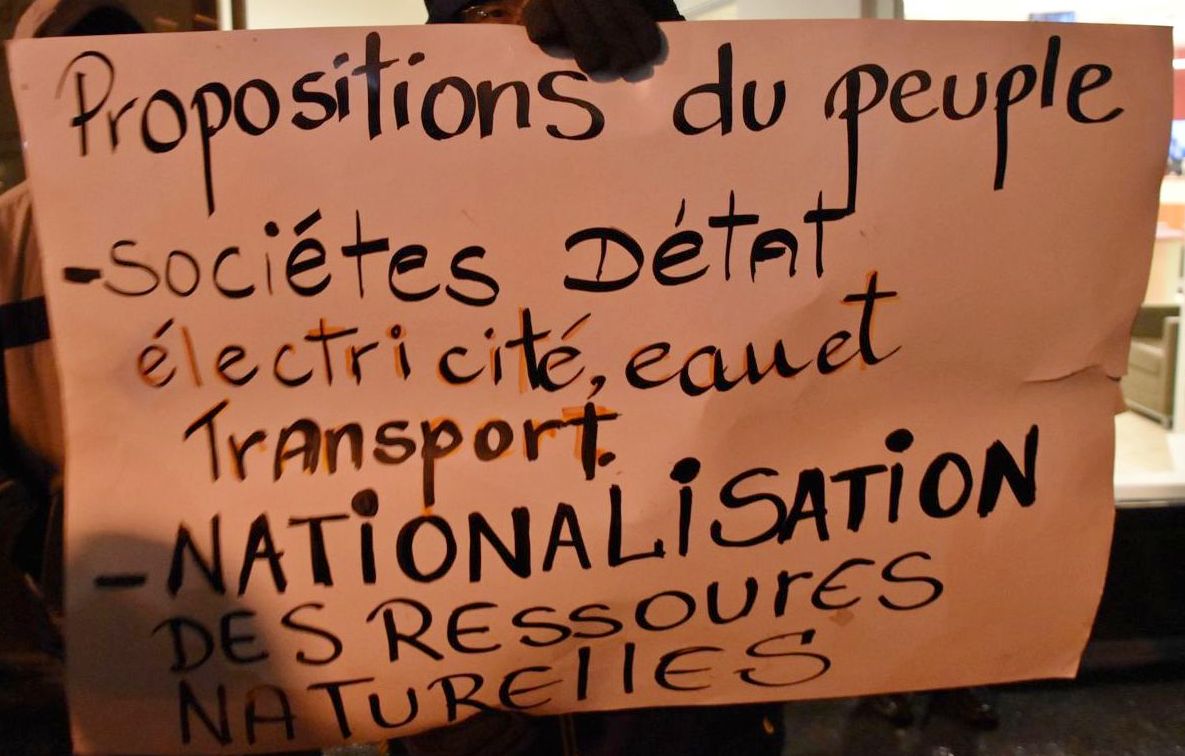 

Canadian Union of Public Employees' Statement on
Bolivia,
November 13, 2019
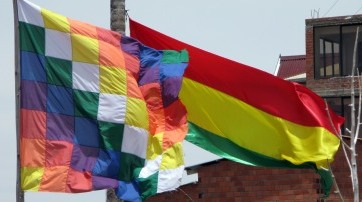 CUPE joins the
international community in raising our concern
about the developing situation in Bolivia, which
has led to a coup. CUPE joins the
international community in raising our concern
about the developing situation in Bolivia, which
has led to a coup.
CUPE calls on the Government of Canada to
recognize and respect the sovereignty of the
Bolivian people to determine their own political
future, without military or foreign interference.
We further call on the Liberals to stop taking
their foreign policy cues from some of the world's
most right-wing governments.
We extend our solidarity and support to the
Bolivian people who will be most affected by the
social or economic instability that accompanies
this attack on their democratic rights.

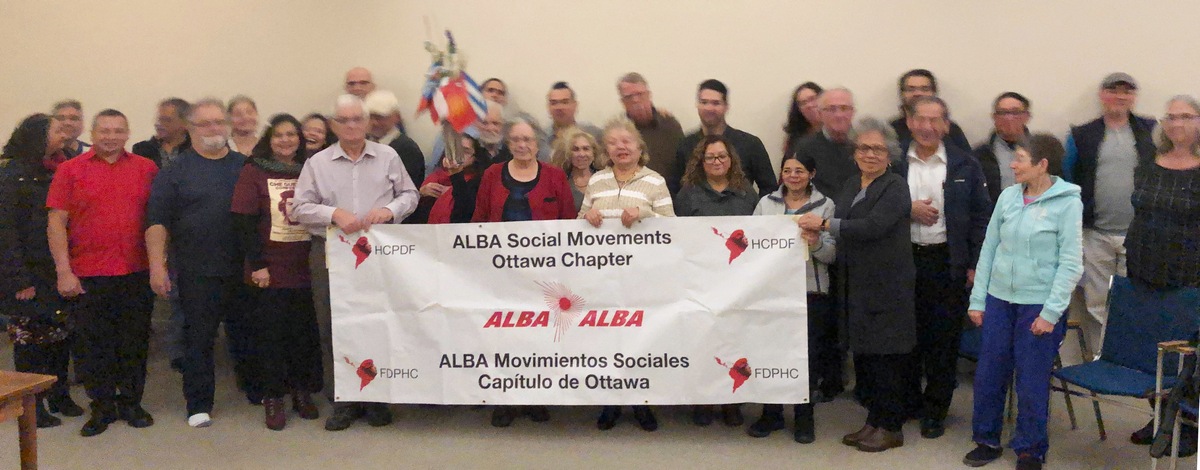
A successful meeting was held on Saturday,
November 9 at the Friends' House in Ottawa,
organized by ALBA Social Movements-Ottawa
Chapter. In his opening remarks, a
representative of ALBA pointed out that the
situation in Latin America is evolving at such a
rapid pace that certain situations are changing on
a daily basis. Generally, the meeting expressed
enthusiasm in light of the struggles of the people
whether in Cuba, Bolivia, Venezuela, Honduras,
Chile, Haiti or Brazil, and their striving for new
beginnings.
Speakers included Giuvel Orozco Ortega,
Counselor-Deputy Head of Mission at the Embassy of
Cuba; Luis Acuña, Chargé d'Affaires at the Embassy
of Venezuela; and Professor Marcelo Saavedra and
Gustavo Saavedra, originally from Bolivia, who
informed those present of the situation in those
countries. Giuvel spoke of how the Trump
administration's new measures to tighten the
blockade are creating a difficult situation for
the Cuban people, and how they are dealing with
the situation whereby 85 per cent of their trade
has been affected. Luis spoke among other things,
of the strange predicament in which the Canadian
government finds itself with regards to diplomatic
norms as it recently officially accepted the
credentials of a Venezuelan ambassador to Canada
named by self-proclaimed president Juan Guaidó.
Meanwhile, it is creating hardships for the
embassy in Ottawa and its staff by such activities
as freezing financial transfers from Venezuela
necessary for its everyday functioning. The two
people who spoke about Bolivia explained the
situation following Evo Morales' election win on
October 20, where right-wing forces have been
instigating open racist violence against the
people as part of an attempted coup.
(The coup against Morales actually took place
the day after this meeting, on November 10.)
Throughout the discussion, it was raised that the
Canadian government must render accounts for its
meddling in the affairs of both Venezuela and
Bolivia and many wondered why it is siding with
those who spread violence and instability against
the people and duly elected governments.
The participants at the meeting expressed
enthusiasm for the liberation of Lula in Brazil on
November 8, and could not help but notice that
Brazil had joined the U.S. and Israel as the only
countries voting against the UN resolution to
denounce the U.S. blockade against Cuba.
Maricarmen Guevara, an organizer with ALBA,
showed slides of the international conference
against imperialism and neo-liberalism recently
held in Havana, Cuba.
Many events were announced as part of stepping up
support for the struggles of the people and the
anti-imperialist struggle of which the Canadian,
Mexican and U.S. working class are an integral
part. Among others, it was emphasized that it is
important to mobilize for the picket on November
13 at the University of Ottawa campus to denounce
the presence of the false Venezuelan ambassador,
for which ALBA is taking the initiative, as well
as the monthly picket, November 17, in
front of the U.S. Embassy in support of Cuba and
its struggle against the inhuman U.S. blockade.
People were also encouraged to sign a letter in
support of the Bolivian people and in opposition
to the violence being waged against the people and
the road the Bolivian people have chosen to
follow, to be delivered to the Embassy of Bolivia.
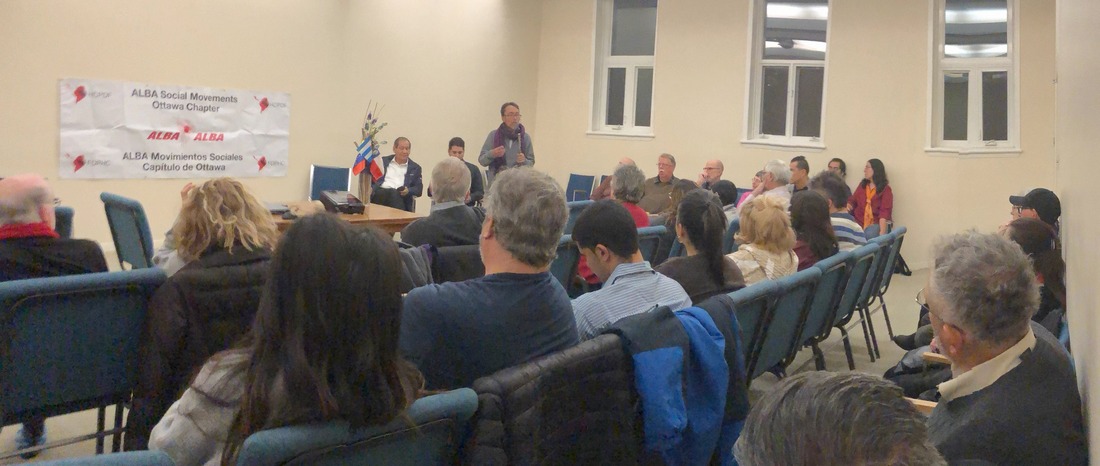

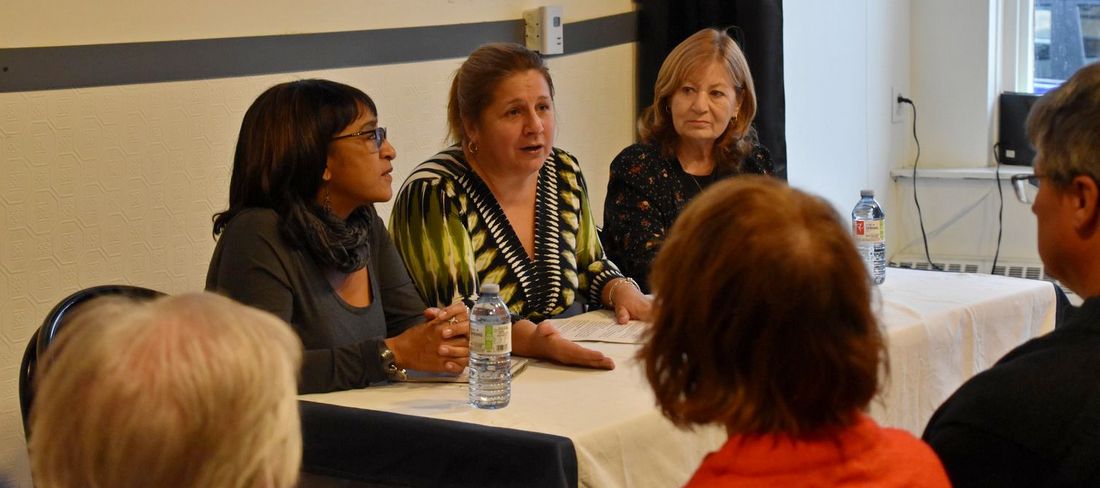
On Sunday, November 10, the Table de concertation
de solidarité Québec-Cuba (Quebec-Cuba Solidarity
Roundtable) organized a meeting with Mara Bilbao
Diaz, Consul General of Cuba in Montreal on the
overwhelming vote in favour of the resolution
opposing the U.S. blockade against Cuba. Nearly 50
people were present, including members of the
Salvadoran, Chilean, and Haitian communities and
activists. To loud applause, Mara announced that
for the 28th consecutive year, the resolution
against the U.S. criminal blockade against Cuba
was adopted by an overwhelming majority at the UN
General Assembly on November 7. This year, 187
countries and nations voted in favour of the
resolution condemning the blockade. The United
States, Israel and Brazil voted against the
resolution; Ukraine and Colombia abstained.
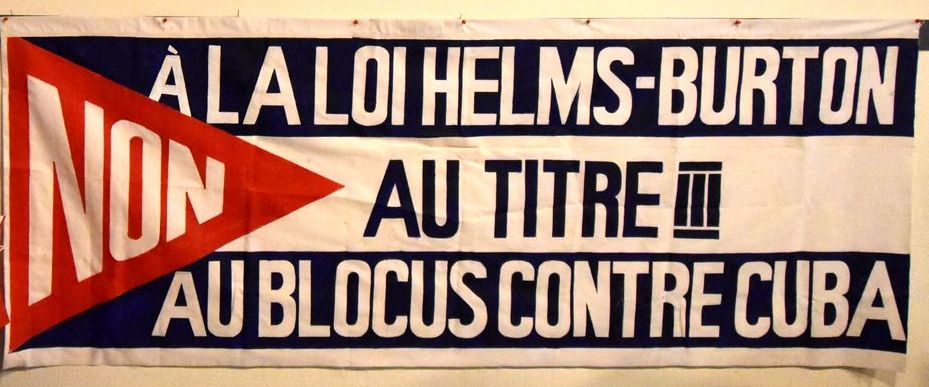
Despite the activation of Title III of the Helms-Burton
Act by the Trump administration in January
2019 and even though the latter exerted enormous
pressure on Latin American countries, Mara said
that the overwhelming majority of votes in
support of the struggle of the Cuban people
exposes how the United States is increasingly
isolated internationally.
She detailed the new attacks against the Cuban
economy by the U.S. government through Title III,
activated for the first time since its adoption in
1996. Every six months since its adoption, the
U.S. administration has examined its feasibility,
but the Trump administration is the first to
implement it. One of the immediate consequences
for Cuba is limited access to fuel. Consequently,
in September Cuba was forced to slow down its
activities. Moreover, the law allows any American
citizen or entity that possessed Cuban land before
the revolution to appear before the courts and
apply for control over any company now located on
the land. This manoeuvre obviously has the effect
of intimidating new investors, which Cuba, like
any other country, needs at this time.
She presented the list of measures imposed on
Cuba: fewer visas issued as well as a reduction in
consular services, the annulment of the agreement
between the Cuban and U.S. baseball
federations, U.S. citizens are no longer able to
travel to Cuba. Direct flights to Cuban airports
are prohibited, except to Havana. In addition,
with the clause prohibiting the sale of all
equipment that has more than 10 per cent U.S.
components, the island's acquisition of new
technologies, drugs and necessary materials has
been rendered virtually impossible. This is
reflected in all aspects of life, with
implications for health care and the treatment of
various diseases.
The 59 years of the blockade, she said, has cost
the Cuban economy over $922 billion. From April
2018 to March 2019, the Cuban government was
deprived of $ 4.34 billion. In spite of this, no
school has been closed and the Cuban health system
is such, noted Mara, that a Cuban who waits
for more than 30 minutes at a clinic or
hospital gets angry and asks to see the
administration!
This spirit is owing to the resistance of the
Cuban people themselves and to their
leadership, said Mara. She also highlighted the
crucial role of international solidarity,
including organizations in Montreal, which month
after month, regardless of the weather, picket the
United States Consulate.
So many movements throughout the world, she said,
including in our Americas, are rejecting
neo-liberalism and its violence against the
peoples. Cuba is testimony to the fact that a
nation can be built around meeting the needs of
the people. This is also the reason for Cuba's
28th victory at the UN General Assembly.
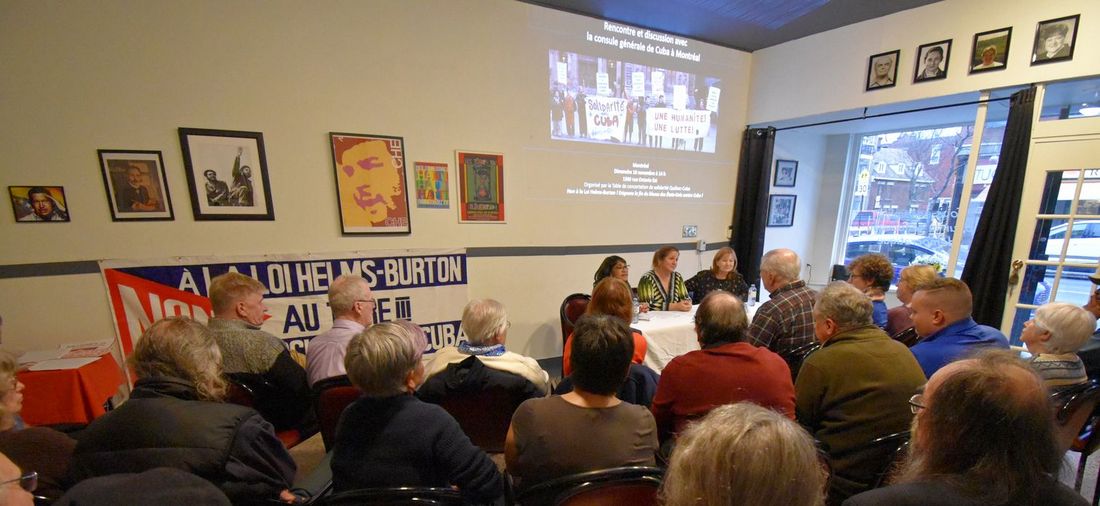
A very lively question period followed the
presentation, interspersed with shouts of Viva Cuba!
When asked what those 28 years of votes against
the blockade represent for Cuba, as the United
States continues to maintain the blockade while
ignoring the resolution, and how the 187 countries
can make their vote effective, the Consul first
explained that the resolutions adopted by the UN
General Assembly are not binding, as the UN
structure does not work that way. However, she
emphasized, the vote has a very important moral
value. The United States, to its detriment,
continues to ignore the decision of an
overwhelming majority of the countries voting in
favour of the resolution, while Cuba's example and
determination continue to shift the votes of
countries against the United States.
For example, the African countries have not
forgotten everything that Cuba has done selflessly
and the blockade has awakened sensitivity in these
countries, which have their own direct experience
with Cuba. These are not just empty words. Cuba
has very little, materially, but selflessly
defends a policy of assistance to countries. It
sends hundreds of doctors. With the emergence of
Ebola in Africa, only three or four countries sent
help and Cuba was one of them. The training of
these doctors in the conditions of the revolution
and the blockade enables them to act care for
people in the most difficult circumstances.
Further, the European Union opposes the blockade
and votes en
bloc in support of the resolution. Some
of the European countries, such as Spain, have
many economic and commercial links with Cuba.
Parliamentarians have moved motions to denounce
the blockade as it affects the interests of Spain.
Of equal importance, through the vote at the
United Nations, Cuba also wants to expose the
illegality and immorality of the blockade.
Other questions were raised about the work of
doctors abroad, their training, and the work of
diplomatic representatives in Canada. The
responses illustrated the tangible imprint of 60
years of revolution on the outlook of the Cuban
people, their daily battle in defence of their
sovereignty and how they tackle problems so that
they are settled in favour of both themselves and
the peoples of the world.
The meeting followed just days after the Havana
Anti-imperialist Solidarity Conference for
Democracy and against Neo-liberalism held November
1-3, which the Table de concertation de solidarité
Québec-Cuba took part in. A slide show of
the conference's proceedings was shown, and a
photo where Nicolás Maduro was seen alongside Raúl
Castro, which sparked applause and shouts of Viva Cuba! Viva
Venezuela! The Conference is testimony to
the fact that Cuba is not alone at a dangerous
time for the peoples of the Americas and the
world.
At the very end of the meeting, news of the
resignation of Evo Morales in Bolivia and the
holding of new elections was announced, and
participants listened to a live press conference
with the Bolivian leadership. Participants
immediately proposed an action to denounce the
coup against the Bolivian government and
people, to be held with an already planned picket
in support of the Chilean people on November 12.
The spirit of resistance to the machinations of
the United States and the highest levels of the
oligarchy in the Americas was front and centre at
the get-together.

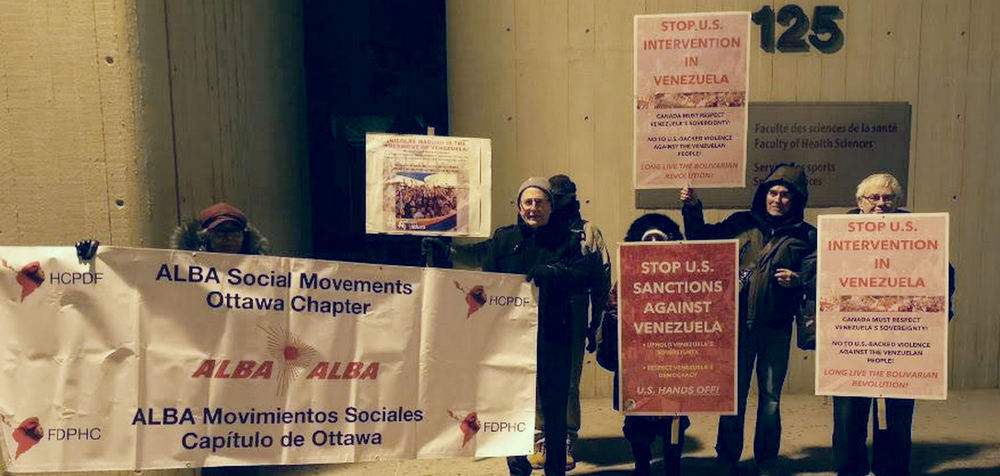
Picket at the University of Ottawa against the
sham ambassador of Venezuela,
November 13, 2019.
Activists, at the call of ALBA Social Movements
Canada, organized a picket at the University of
Ottawa on the evening of November 13 of an event
announced as a "meeting of the Venezuelan
community with the ambassador of Venezuela in
Canada, Orlando Viera-Blanco." To promote this
bogus ambassador, whose credentials are themselves
from a self-proclaimed president, is farcical
indeed. The problem is that the Canadian
government is one of the architects of the farce.
According to diplomatic norms, sovereign nations
nominate their ambassadors but Canada's Governor
General has recognized the credentials of a
self-proclaimed phony President of Venezuela and
is doing whatever possible to declare this
legitimate. In terms of the norms of Canadian
diplomacy, this is without precedent and shows how
desperate Canada is to do yeoman's service for the
U.S. imperialists.
In 2015, Barack Obama declared Venezuela a
"threat to the national security of the United
States" and later, former U.S. National Security
Advisor John Bolton, under the Trump
administration declared that Venezuela, along with
Cuba and Nicaragua, constituted a "triangle of
terror" and that they were the "cause of immense
suffering, the impetus of enormous regional
stability." The fact of the matter is that the
main causes of immense suffering and instability
in the region are the blockades imposed on Cuba
and now Venezuela, as well as the coups d'état --
sired in part by Canada -- against Haiti,
Honduras, Brazil and now Bolivia, amongst others.
The constant interference of the U.S. and its
cronies, such as Canada, in the affairs of
sovereign countries cannot be justified under the
cover of high ideals.
Speaking at the picket, organizers said: "Canada
is not playing the role that Canadians expect of
it. We oppose interference in the internal affairs
of other countries and we want our governments to
respect duly elected, sovereign governments
abroad. We refuse to play the game of the U.S. of
imposing regime change through destabilization,
blockades and threats of military intervention,
whether under the banner of humanitarian aid or
any other pretext. In this respect, the Canadian
government must stop its shenanigans within the
discredited Lima Group and return to basic
diplomatic norms which involve recognizing one
legitimate Venezuelan ambassador in Canada who was
appointed by the duly elected government of
Nicolás Maduro. This ambassador must be granted
all the privileges and rights which become such an
official function. Only in this way can the
Canadian government have some semblance of being
'rules-based.'"

- Marie Dimanche, Frantz Andé and
Yves Engler -
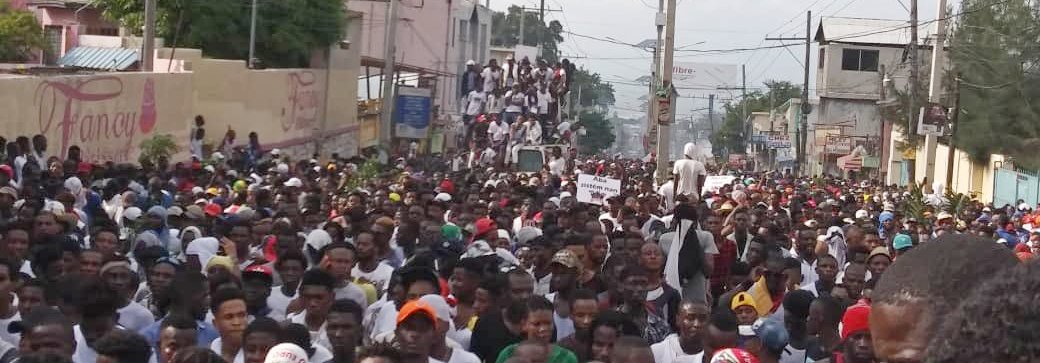
Rising with Haiti!
Montreal
Sunday,
November 17 -- 12:30-4:30 pm
Place
Toussaint-Louverture, 137 De
Maisonneuve Blvd East,
(between Sanguinet and
Saint-Dominique)
Organized by: Solidarité
Québec-Haïti
Facebook
|
|
Protesters recently lobbed a Molotov cocktail and
set fire to tires in front of the Canadian Embassy
in Port-au-Prince. At another rally, protesters
threw stones at Canada's diplomatic representation
in Haiti and a protester was filmed holding a sign
saying, "Fuck USA. Shit France. Fuck Canada."
Although disturbing to most Canadians, these acts
reflect the anger of an impoverished people who
are tired of foreign governments managing their
affairs.
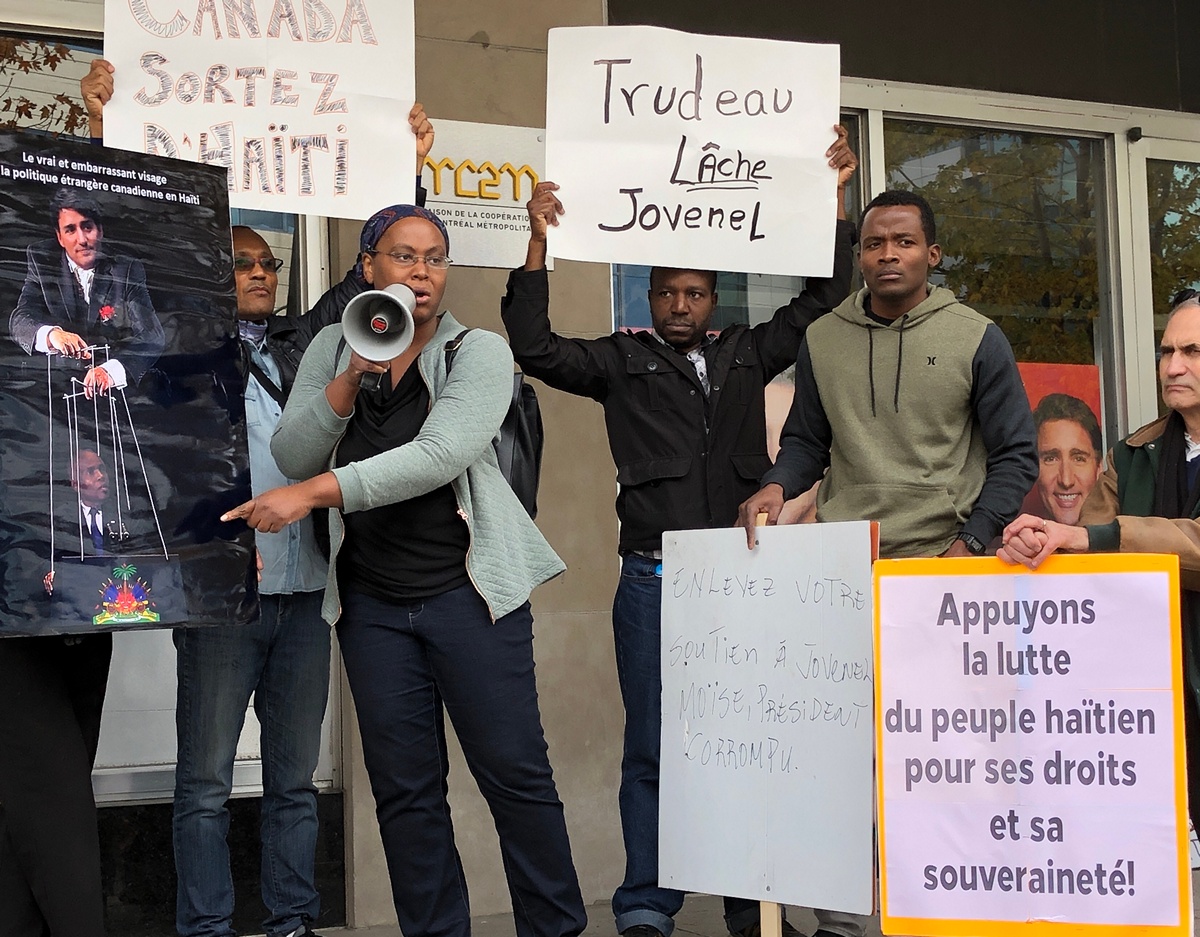 For more than a
year, Haitians have engaged in a remarkable
popular uprising against a corrupt and repressive
president who is backed by foreigners. Since
September, schools and businesses in
Port-au-Prince have been largely closed due to
demonstrations opposing the president, racism and
economic inequality. Haitians also reject Canadian
foreign policy. For more than a
year, Haitians have engaged in a remarkable
popular uprising against a corrupt and repressive
president who is backed by foreigners. Since
September, schools and businesses in
Port-au-Prince have been largely closed due to
demonstrations opposing the president, racism and
economic inequality. Haitians also reject Canadian
foreign policy.
Jovenel Moïse remains president because he has
the support of Ottawa, France, Washington and
other members of the so-called "Core Group."
Canada is providing the unpopular president with
significant financial, diplomatic and police
support.
Over the last 15 years, Haitians have
increasingly identified Canada as one of the
foreign powers holding significant historical
weight over their country. On January 31, 2003,
Ottawa hosted a secret meeting -- revealed by
eminent Quebec journalist Michel Vastel -- to
discuss Haiti's future. No Haitian representative
was invited to the summit where senior U.S.,
Canadian, French officials and representatives
from the Organization of American States discussed
the overthrow of elected president Jean-Bertrand
Aristide, placing the country under international
trusteeship, and the resurrection of the dreaded
Haitian army.
Thirteen months after that meeting, the United
States, France and Canada overthrew Aristide. Over
the next two years, they imposed a government
responsible for thousands of deaths. The coup
d'état also gave rise to a United Nations military
force which, by dumping its feces into the
waterways, caused a cholera epidemic that claimed
the lives of 10,000 people.

Rally at Justin Trudeau's campaign office in
Montreal, October 12, 2019, demands
that Canada withdraw support of illegitimate
regime of Jovenel Moïse in Haiti.
Following the deadly earthquake of 2010, Canadian
leaders continued their inhuman and undemocratic
agenda. According to internal government documents
that the Canadian press examined a year after the
disaster, officials in Ottawa were concerned that
a power vacuum after the earthquake would lead to
a "popular uprising."
A "secret" briefing note explained that,
"Political fragility has increased the risks of a
popular uprising and fuelled the rumour that
former President Jean-Bertrand Aristide, currently
in exile in South Africa, wants to organize a
return to power."
The documents also explain the importance of
strengthening the capacity of the Haitian
authorities to "contain the risks of a popular
uprising." To control the traumatized and
suffering population of Haiti, 2,050 Canadian
soldiers were deployed alongside 12,000 U.S.
soldiers and 1,500 UN soldiers (8,000 were already
on site).
One year after the earthquake, the United States
and Canada forced presidential candidate Michel
Martelly, from third to first place in an election
from which Aristide's party was barred. Martelly
is the mentor of Moïse, a central figure in the
billion-dollar corruption scandal that recent
protests tirelessly denounce.
It comes as no surprise that Haitians are angry
with the Canadian government.
However, another Canadian position is also being
proposed. On October 31, the Quebec National
Assembly unanimously approved a motion affirming
"our unreserved solidarity with the Haitian people
and their desire to find a stable and secure
society." It calls for "support of any peaceful
and democratic resolution that emanates from
stakeholders within Haiti's civil society."
A week earlier, the Concertation pour Haïti, a
group of Quebec NGOs and unions, called for
"Canada to make the right choice and use its
influence within the international community to
support" a presidential transition.
Last week, David Suzuki, Amir Khadir, Roger
Waters, Maude Barlow, Yann Martel and more than
100 other writers, musicians, activists and
teachers signed an open letter inviting the
Canadian government to stop supporting a corrupt,
repressive and illegitimate Haitian president.
On November 17, Solidarité Québec-Haïti is
organizing a demonstration in solidarity with the
popular revolt movement in Haiti.
Join us !
Marie Dimanche is the founder of Solidarité
Québec-Haïti #Petrochallenge 2019. Frantz André
is a member of Solidarité Québec-Haïti and also
represents the Action Committee on Non-Status
Persons. Yves Engler is a member of Solidarité
Québec-Haïti and the author of 10 books.

Coming Events
Monthly Pickets, Sunday
November 17

Montreal
5:00-6:00 pm
Inside
Place-des-Arts Metro Station, near the
turnstiles of
the exit to the bookstore Archambault.
Organized
by: Table de concertation de solidarité
Québec-Cuba
tableqccu@gmail.com
Ottawa
1:30 pm
U.S. Embassy,
Mackenzie St. (Major's Hill Park side)
Organized
by: Ottawa-Cuba Connections
ottawacubaconnections@gmail.com
Vancouver
4:00 pm
U.S. Consulate,
1075 W. Pender Street
Organized
by: Friends of Cuba Against the U.S. Blockade –
Vancouver
www.vancubasolidarity.com

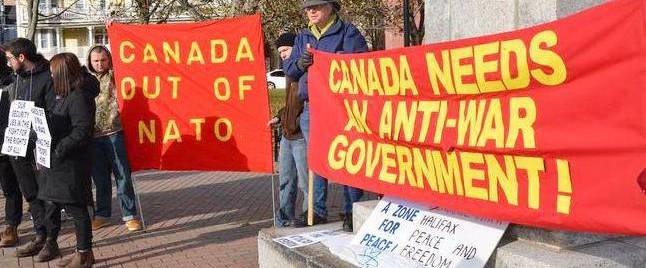
Oppose the U.S.-Based Halifax
International Security Forum!
Saturday, November
23
The U.S.-based Halifax
International Security Forum (HISF), known to
the anti-war movement as the Halifax War
Conference, returns to Halifax for the 11th
year in a row from November 22 to 24. Every
year, this event brings warmongers and war
criminals, and their handmaidens, to plan
further aggression against the peoples of the
world. This is unacceptable. Join in actions
to get Canada out of NATO, Make Canada a Zone
for Peace and reaffirm that Halifax is "No
Harbour for War"!
Halifax
Rally -- 1:00 pm
Halifax Peace
& Freedom Park
(formerly
Cornwallis Park) Hollis & South Sts.
Meeting and Panel Discussion -- 6:30
pm
Dalhousie Student
Union Building, Room 302
6136 University
Ave.
Toronto
Picket -- 1:00 pm
NATO Association of Canada
48 Yonge St. (near King Subway Station)
Organized by:
Communist Party of Canada (Marxist-Leninist),
Canadian Voice of Women for Peace
For information: 647-907-7915.
Toronto Events
to Oppose NATO, Foreign Intervention
and Militarism
Monthly Picket
Canada Out of NATO!
Tuesday, December 3 -- 12:00-1:00 pm
NATO Association
of Canada
48 Yonge Street
(near King Subway Station)
Come for our last
protest of NATO this year!
In solidarity with protests at the NATO leaders
summit in the UK!
Organized by: Canadian Voice of Women for Peace
Facebook
Picket at Foreign Minister
Freeland's Office
Stop the Coup Against Venezuela!
Stop the Arms Sales to Saudi Arabia!
Tuesday,
December 3 -- 3:00-4:00 pm
344 Bloor St. W.
Organized by:
Canadian Voice of Women for Peace
Community Discussions on the
Climate Crisis
Climate and the Military
Tuesday,
December 10 -- 7:00-8:30 pm
OISE, Second Floor, Room 2296, 252 Bloor St. W.
Organized by:
Extinction Rebellion Toronto, Science for Peace
Facebook

(To access articles
individually click on the black headline.)
PDF
PREVIOUS ISSUES
| HOME
Website: www.cpcml.ca
Email: editor@cpcml.ca
|

For more than a
year, Haitians have engaged in a remarkable
popular uprising against a corrupt and repressive
president who is backed by foreigners. Since
September, schools and businesses in
Port-au-Prince have been largely closed due to
demonstrations opposing the president, racism and
economic inequality. Haitians also reject Canadian
foreign policy.

 There is
irrefutable evidence that the events which
transpired over the past week are connected to
U.S. efforts to co-opt and influence military and
police forces in the region through programs it
has in place for this purpose. In addition,
leaked audio tapes have emerged which suggest
certain U.S. politicians and embassy officials
worked with retired Bolivian military officers and
opposition politicians and some others to organize
and finance the kind of violent and destabilizing
actions that have taken place as well as the
creation of a parallel government if Evo won the
election. That such a plan existed is given
credibility by the fact that according to Evo, a
member of his security team told him he had been
offered $50,000 to hand Evo over to his political
enemies.
There is
irrefutable evidence that the events which
transpired over the past week are connected to
U.S. efforts to co-opt and influence military and
police forces in the region through programs it
has in place for this purpose. In addition,
leaked audio tapes have emerged which suggest
certain U.S. politicians and embassy officials
worked with retired Bolivian military officers and
opposition politicians and some others to organize
and finance the kind of violent and destabilizing
actions that have taken place as well as the
creation of a parallel government if Evo won the
election. That such a plan existed is given
credibility by the fact that according to Evo, a
member of his security team told him he had been
offered $50,000 to hand Evo over to his political
enemies.







 The overthrow of
the MAS government and the victory of pro-U.S.
interventionist forces, for the present moment,
represent a monumental setback for the Bolivian
people as well as for the cause of regional
independence and democracy, akin to the rise of
Pinochet in Chile in 1973.
The overthrow of
the MAS government and the victory of pro-U.S.
interventionist forces, for the present moment,
represent a monumental setback for the Bolivian
people as well as for the cause of regional
independence and democracy, akin to the rise of
Pinochet in Chile in 1973.










 CUPE joins the
international community in raising our concern
about the developing situation in Bolivia, which
has led to a coup.
CUPE joins the
international community in raising our concern
about the developing situation in Bolivia, which
has led to a coup.







